Traveling by bicycle in Muslim countries
What to expect?

This post is about the first-hand experiences of bicycle travelers in countries where Islam is the predominant religion.
About solo women, solo men, and couples; the problems they face as travelers, and the pleasures they receive in those countries.
Western society has certain preconceptions towards Muslims. Many people believe that Muslim countries are not safe for travel and that women are treated badly by men.
But travelers over and over again are raving about the kindness and hospitality in areas where Islam is present and how much they enjoyed those areas.
Nevertheless, traveling in countries where Islam is dominating daily life is not always easy, and most importantly, experiences differ tremendously between genders and areas, even within one country.
Sometimes it is not easy to know how to behave and what to expect.
I thought it’s time to listen to and share the experiences of bicycle travelers who have spent a lot of time in Muslim countries and traveled intensively among the people.
Content:
*Participants
*Easy – Difficult countries
*Likes/Advantages
*Dislikes/Disadvantages
*Invitations
*Questions & Interests
*On the Street
*Avoiding Sexual Harassment
*Where to stay
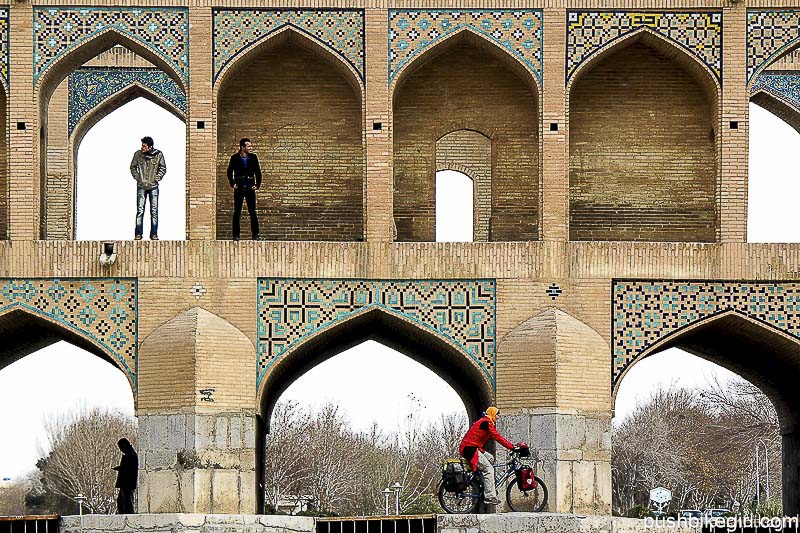
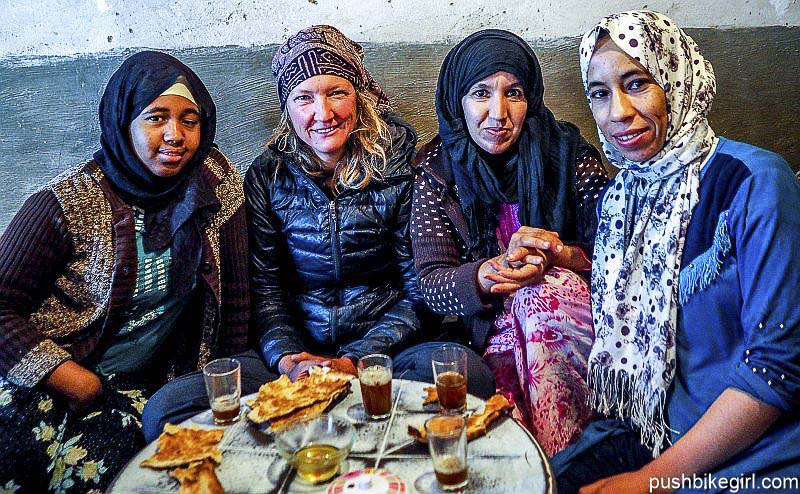
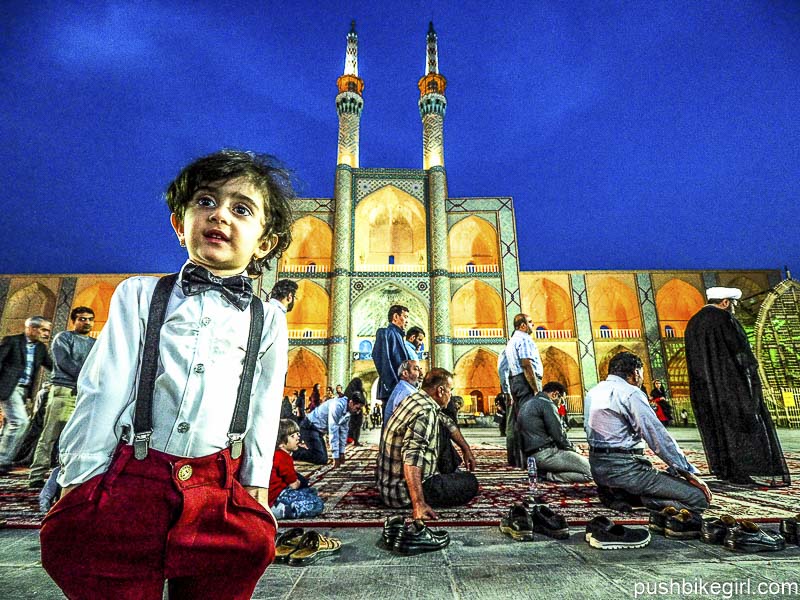
* PARTICIPANTS *
Cinderella Servranckx (47) Netherlands
6 years – 48 countries – approx 50.000 KM
cyclingcindy.com
Facebook – Instagram
Cindy has not only cycled but also lived a few years in different Muslim countries.
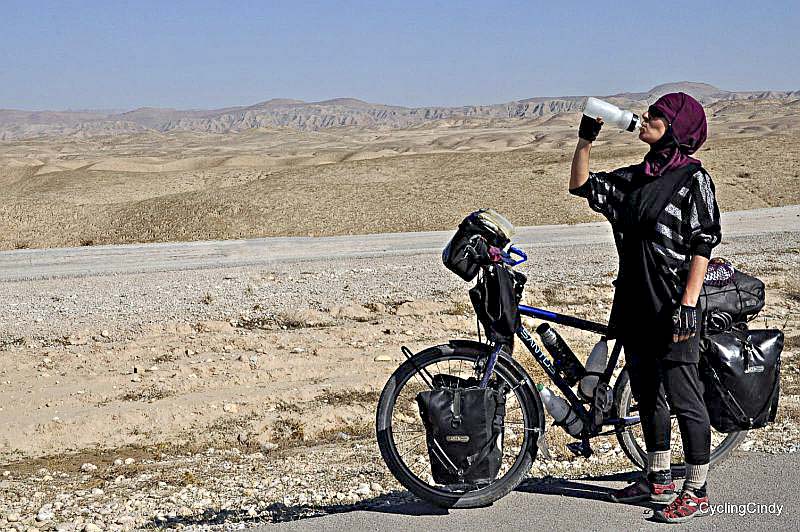
My understanding of conduct has grown over time, and this does not come naturally upon entering any Islamic culture for the first time.
It is very hard to tell how easy or hard countries are to travel in, as it all depends on experience, age, region, and situation.
As an unaccompanied woman on a bicycle, you put yourself in a place where no Muslim woman is.
Thus, you are creating a position that is very unusual for most of the population, with all possibilities flowing forth from this choice.
You have to be willing to pay the costs, not them.
Easy countries:
Oman
United Arab Emirates
Northern Iraq
India
All of the countries on the west coast of Africa
Difficult:
Turkey
Iran
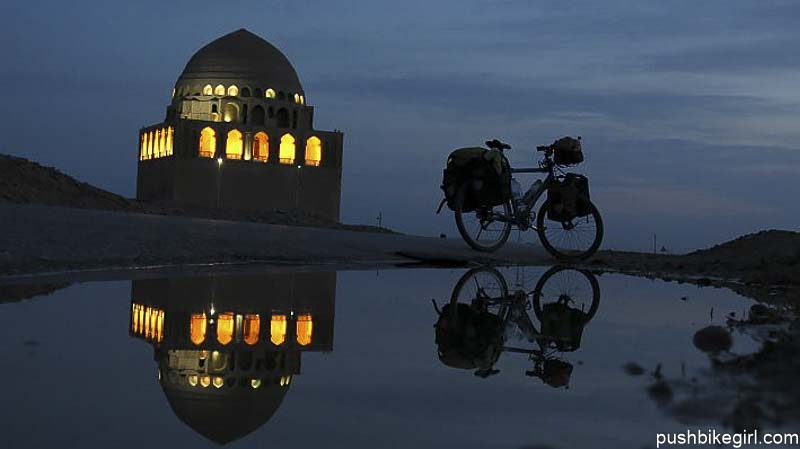
Francois Loncke (28) – Belgium
35.000 KM, 27 countries, 2 years
francisbikeon.wordpress.com
Instagram
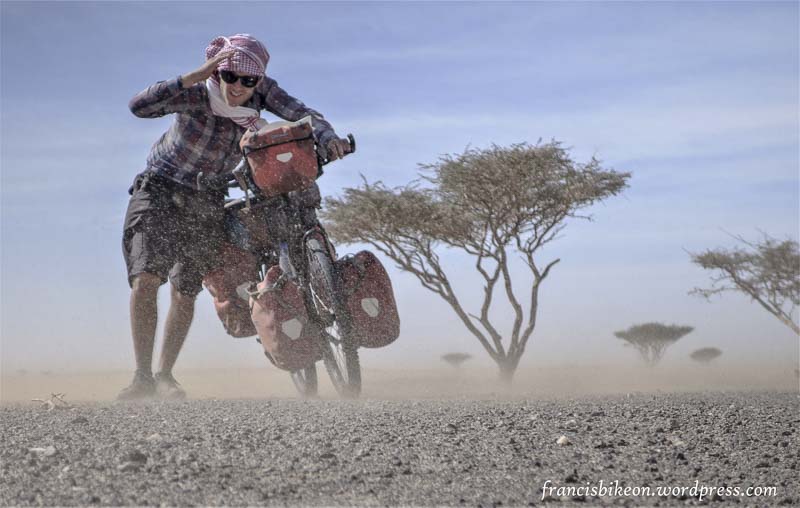
Reflecting on Muslim countries, I realize it’s hard and dangerous to generalize. Diversity reigns.
All of them are highly patriarchal and that impacts me by how much contact I can have with women.
Least contact to women in:
Saudi Arabia
Sudan
Iran (older generation)
Average:
Malaysia
Tajikistan
Kyrgyzstan
Uzbekistan
Turkmenistan,
Most contact:
Kazakhstan
United Arab Emirates
Iran (younger generation)
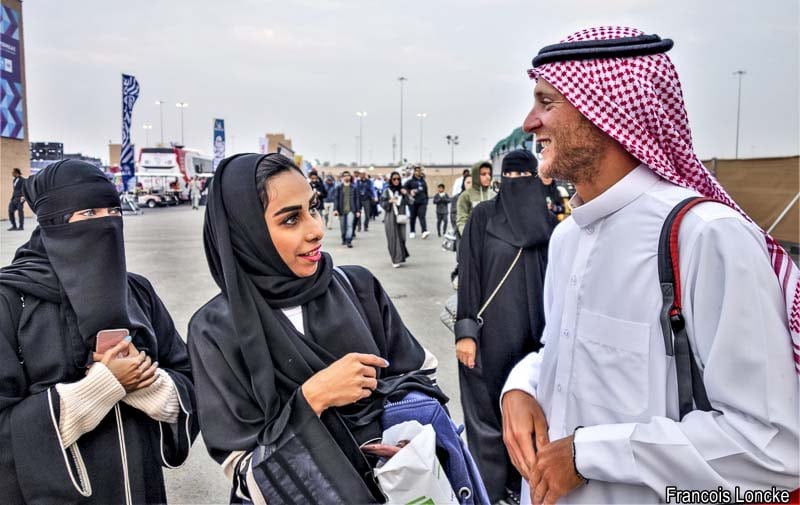
Katja Zivec (42) Slovenia
Miroslav Kadlec (47) Czech Republic
Cycled 33 countries, on the road since 2002
www.cyclingnomads.org
Facebook cyclingnomads – nomads creations
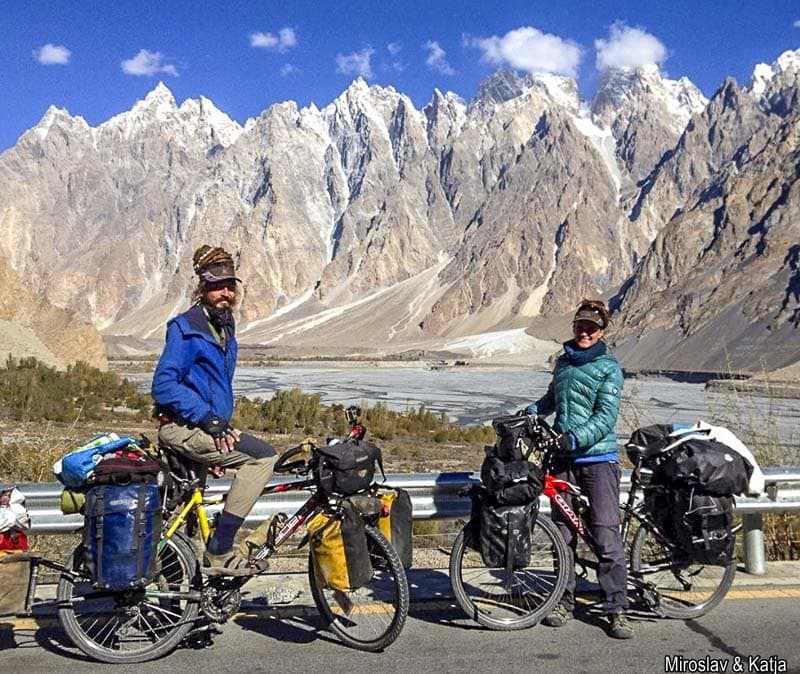
We would like to tell all of you out there not to be afraid to visit Muslim countries and their amazing and hospitable people.
The majority of people are good all around the world. Of course, there are bad people, but you can find them anywhere.
We were mostly treated equally unless in very strict religious families. Everywhere we met beautiful, open-hearted people happy to help.
We cycled in:
Bosnia, Turkey, Syria, Jordan, Egypt, Malaysia, Indonesia, Azerbaijan, Kazakhstan, Uzbekistan, Western China, Pakistan
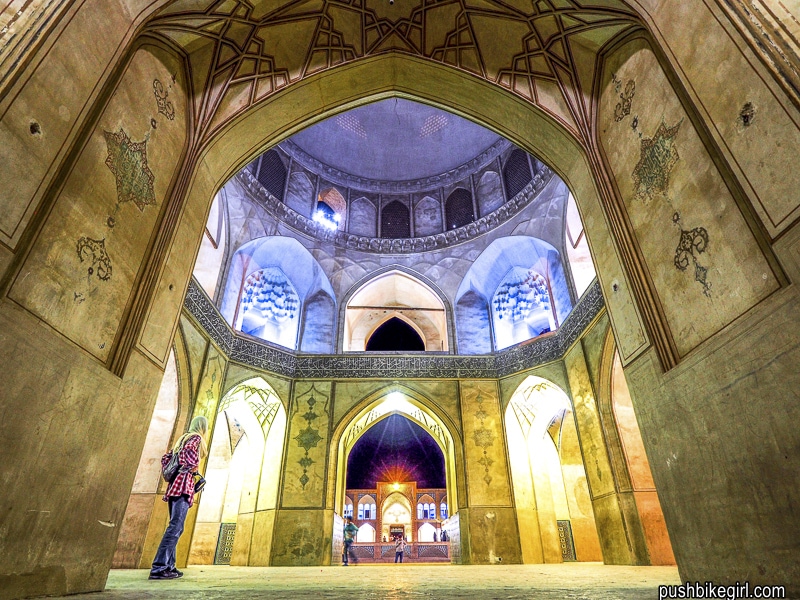
Ewa Świderska (in her 40’s) Poland
5 years – 80.000 KM – 40 countries
ewcyna.com
Instagram – Facebook
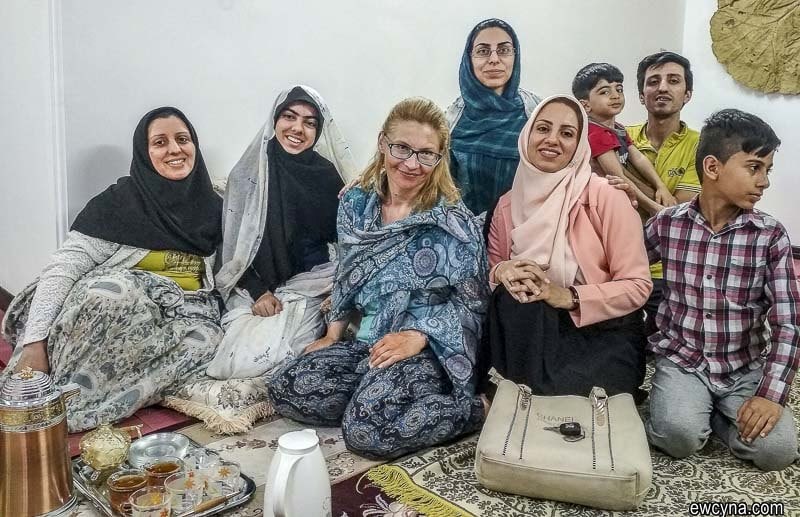
Women traveling in Muslim countries should be super respectful of local customs, adjusting your dress code is a must no matter what anyone tells you.
It is inappropriate to show much of your body.
Also, men are not allowed, or it is not common to touch women, remember that and do not allow this. If you stick to these rules, you’ll have a great time.
Easy:
Western China
Kazakhstan
Kyrgyzstan
Uzbekistan
Azerbaijan
Albania
Medium:
United Arab Emirates
Oman
Turkey
Difficult:
Iran
As in most of these countries, regular precautions are ok.
In Iran, a woman should not travel solo by bicycle, especially in more remote areas.
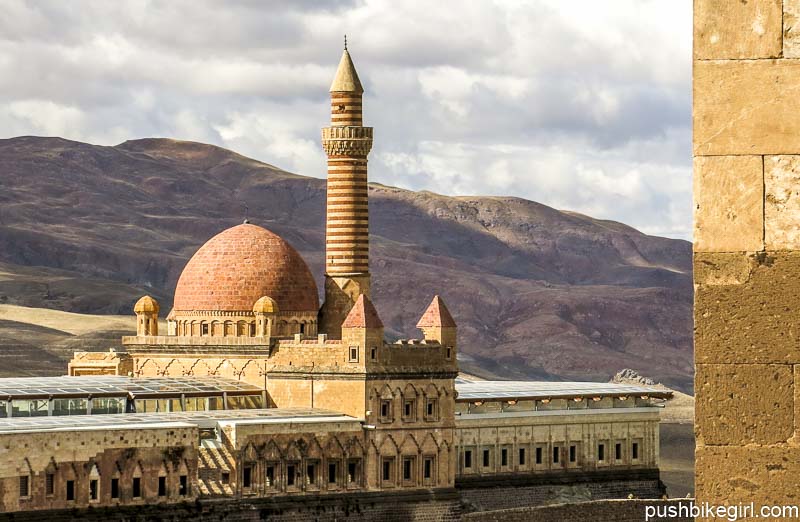
Nicolas Marino (41) Argentina
87.000 km, cycled over 60 countries, 6 years
nicolasmarino.com
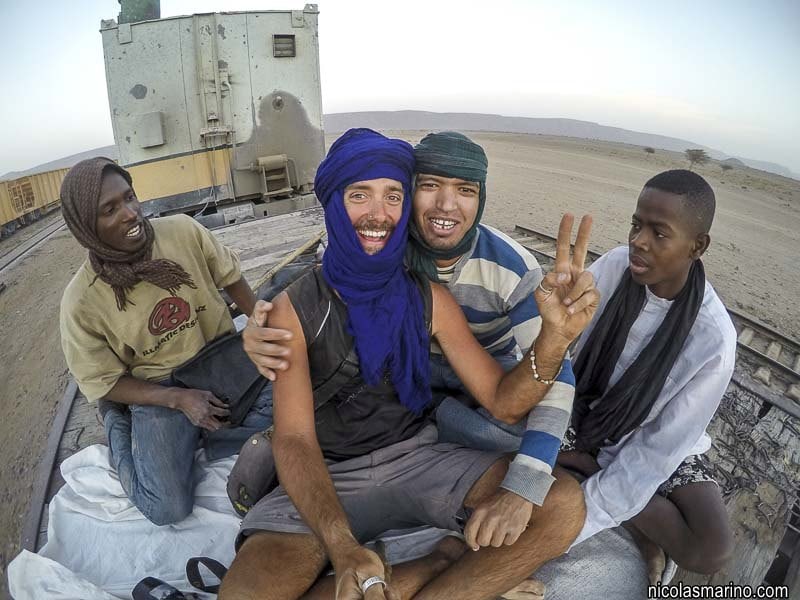
Traveling in Muslim countries is a wonderfully humbling experience, one that can truly touch your heart and change you forever.
It’s also a very revealing one since Islam is constantly and actively demonized in the West.
Media does its magic, they take advantage of some events perpetrated by some people that call themselves Muslims.
(When in reality they are simply extremists and extremists use religion as an excuse, but they are lunatics with no religion). And all of a sudden you get the wrong idea about a culture you don’t know.
In my personal experience, as a non-Muslim, Islam is a symbol of love and pure hospitality.
Are they perfect? No way! Do I agree with everything in their culture? Definitely not.
But there’s no such perfect culture, and I’m far from agreeing with everything within my own culture. I practice tolerance and compassion first and foremost.
Least contact to women in:
Pakistan
Mauritania
Egypt
Morocco
All of the rest were fine:
Indonesia
Malaysia
India
Western China
Sudan
Iran
Countries in Sahel and Sub-Saharan Africa
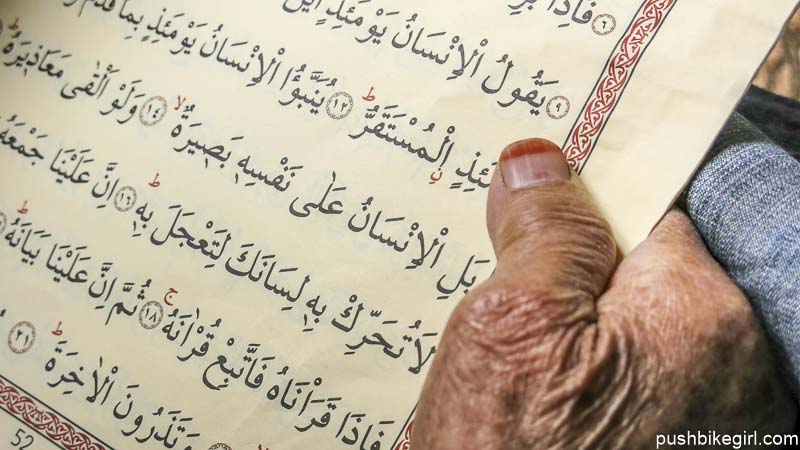
Fernando (42) & Rita (35) Portuguese
Cycled 14.000km – 28 months
9 African countries (on baby pause)
Facebook
Instagram Fernando
Instagram Rita
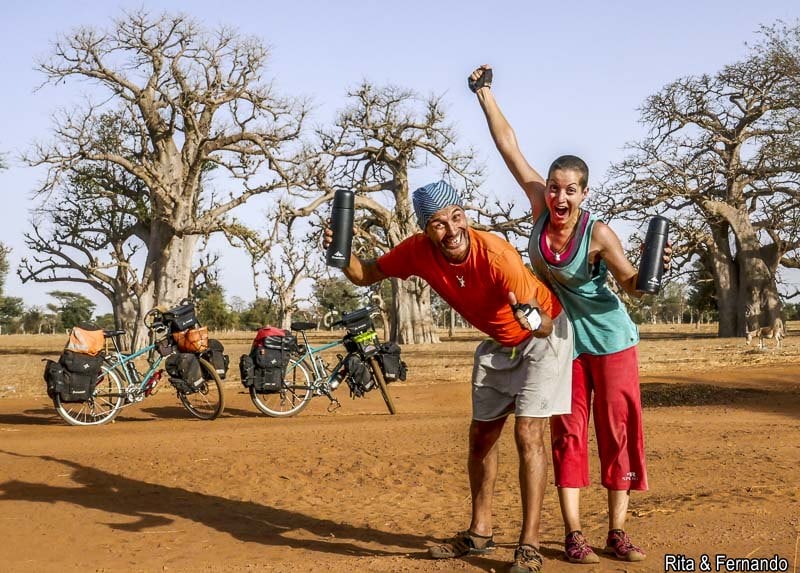
We spent 9 months in Morocco cycling back and forth, staying with locals, plunging into their culture as much as possible, and we don’t regret a single bit.
But we’re not sure we would have had the same experience if we were on our own – at least for Rita.
In Morocco and Mauritania there’s still a very different way of interpreting what it means to be a non-Muslim, European, or American woman.
Least equal treatment:
Mauritania
Average:
Morocco
Senegal
Gambia
Most equal:
Guinea-Bissau
Mali
Guinea
Sierra Leone
Ivory Coast
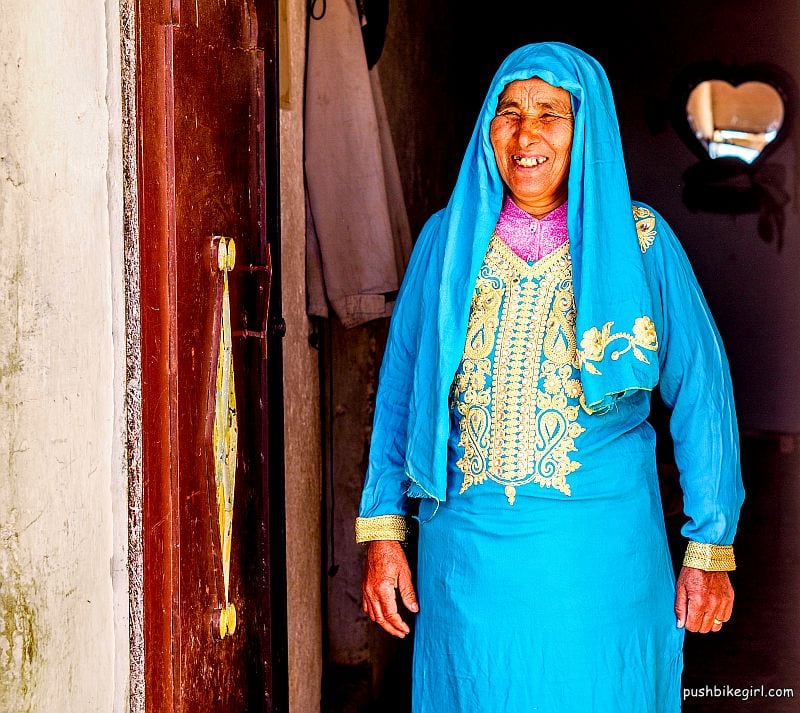
Heike Pirngruber – Pushbikegirl (47) German
6 years cycling – 85.000 KM – 66 countries cycled
Instagram – Facebook
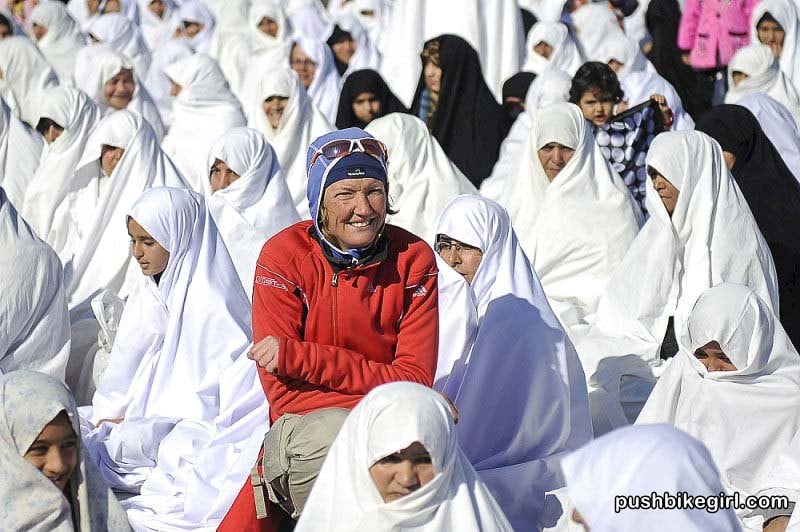
Even if some Muslim areas can be tricky as a solo woman, I almost always like them a lot. The hospitality in those countries and the warm hearted people are honey for my soul.
Being solo on the road makes it hard not to feel lonely sometimes. Therefore, it is such a pleasure to be part of a family and treated as a sister or daughter in a family’s home.
Food tastes a lot better when it is shared, and Muslims are experts in sharing.
Easy:
All West African countries
Morocco
Albania
United Arab Emirates
Oman
Uzbekistan
Turkmenistan
Kazakhstan
Western China
Average:
Kyrgyzstan (too much alcohol)
Difficult:
Iran
Turkey (most difficult)
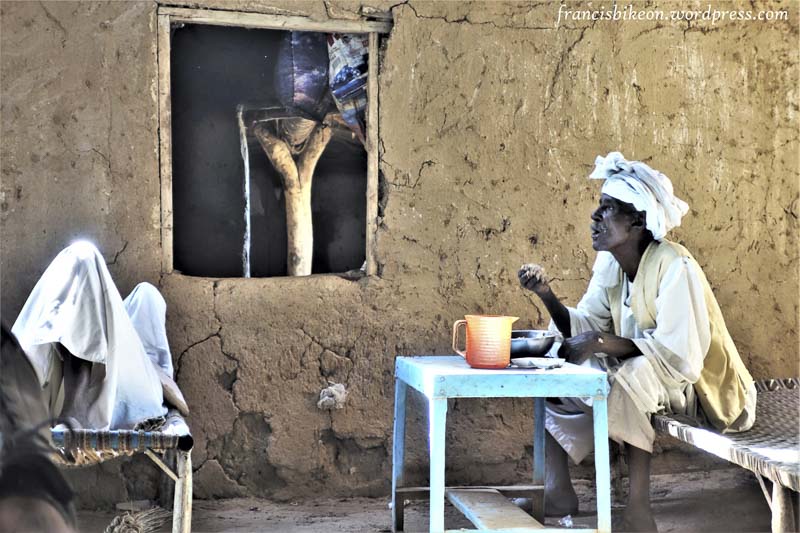
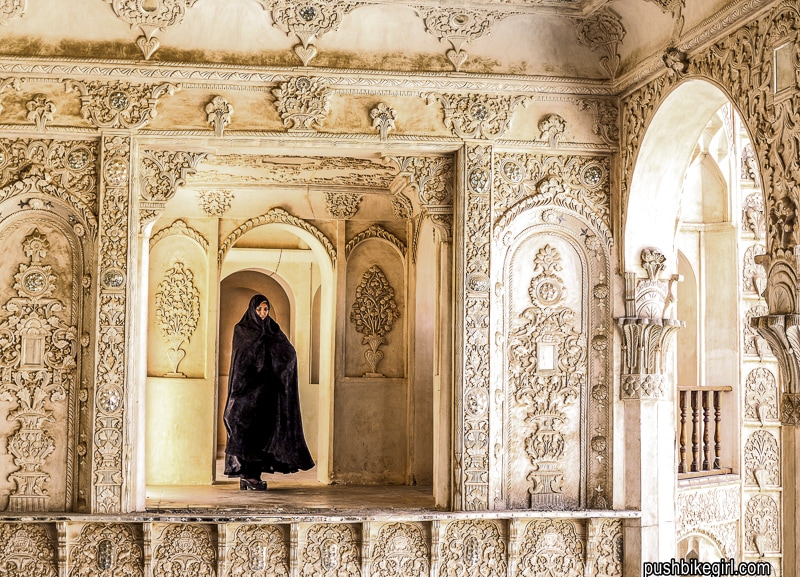
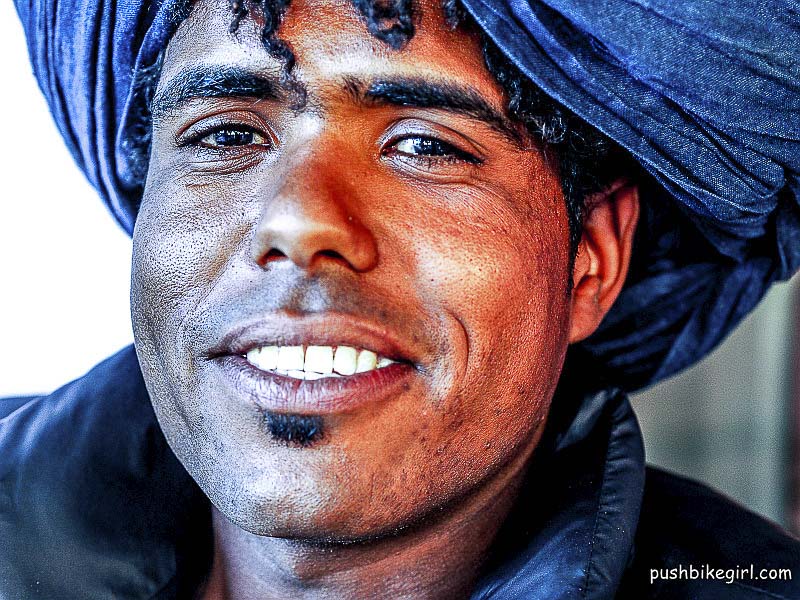
*LIKES / ADVANTAGES*
Cindy:
What I like about Muslim countries is that the culture and customs are more in tune with my innate wants, morals, and preferences.
The advantage of being a single woman is that we get the best of both worlds.
A decently dressed Western woman is no threat to a Muslim woman, culturally or sexually, as long as her man acts decently therefore, I can interact freely with both genders.
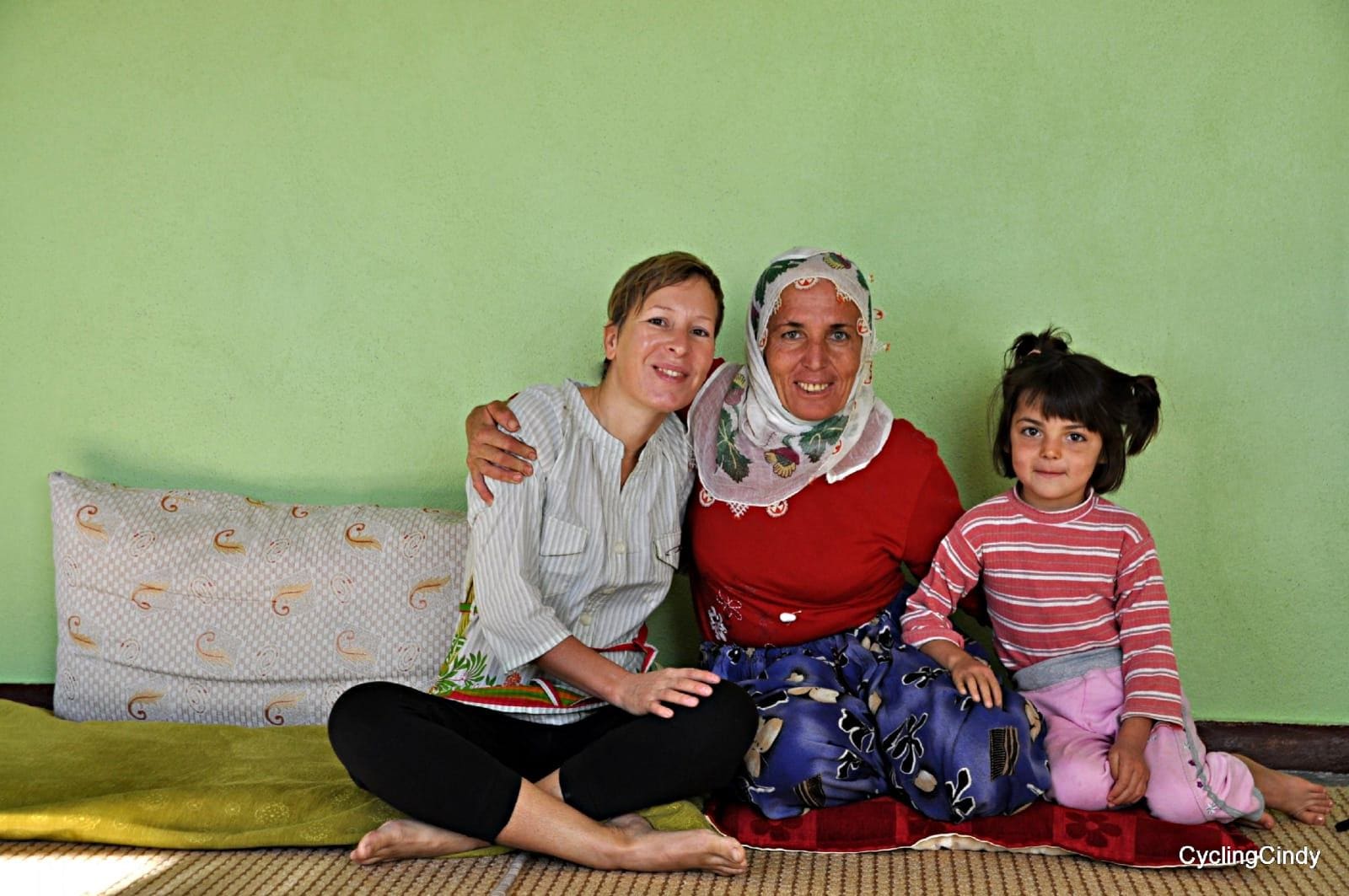
Francis:
I like the beautiful architecture of the mosques, the melodious chants of the Muezzin (when not at 5 in the morning ?)
Sometimes, religious devotion is impressive and gives goosebumps (Mecca, Mashhad).
Traveling in Muslim countries, especially Saudi Arabia, taught me a lot about my own religious roots (catholic).
I like the hospitality. Foreign means guests. I was often invited home even though I had planned on camping, my hosts explaining that according to the Quran, one should not let anybody sleep outside if one can offer shelter.
In these patriarchal societies my conversations are mostly with men who talk to me directly and respectfully as an equal.
“Man to man” makes for understandable and comfortable conversations. And as a foreigner I’m shown more tolerance when breaking with local dress codes.
I like the sense of safety in everyday life (except Tajikistan because I entered 3 days after Isis attacks against cyclists)
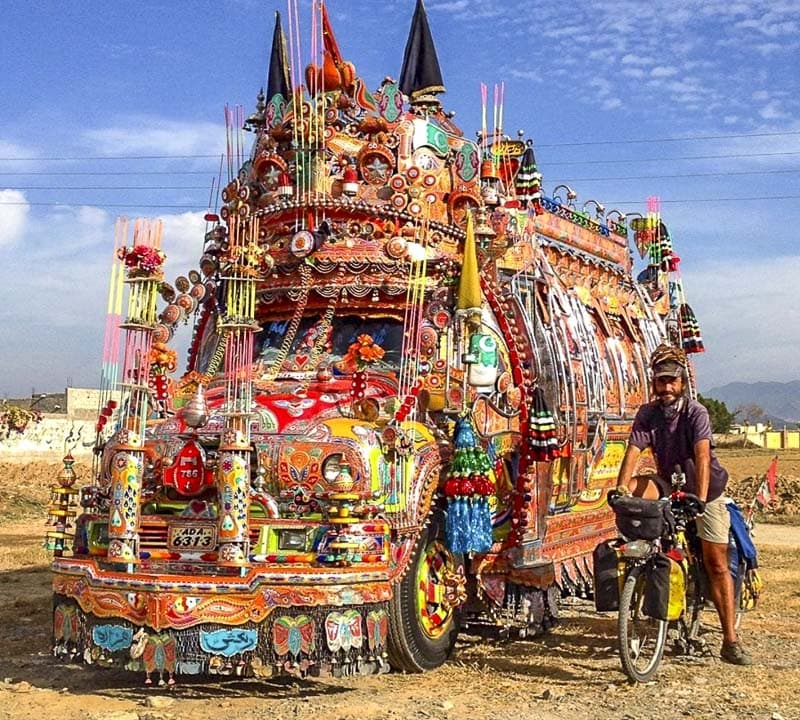
Katja & Miro:
We liked people’s hospitality, kindness, and big hearts. People invite you inside their homes and treat you as family members, even though it is the first time you have met.
They would share the last piece of bread with a total stranger.
I remember how scared I was just before we went to Pakistan, from all the news we heard and worries from friends and families I was considering not going, but my heart was stronger and I’m glad I listened to it and had the most amazing 7 months.
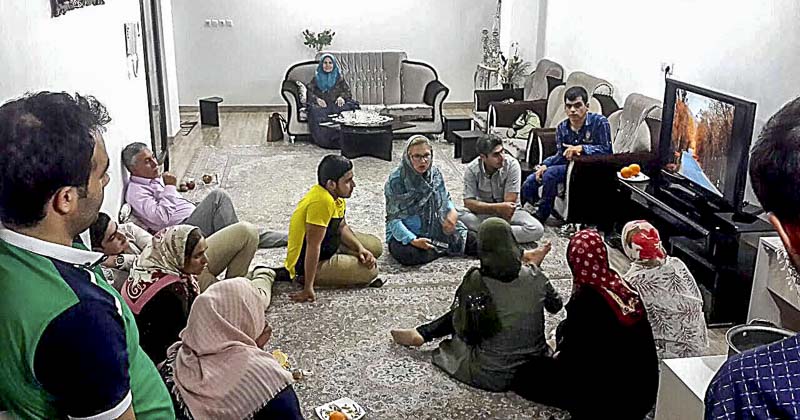
Ewa:
People in Muslim countries are hospitable. A guest might feel that they are being treated like royalty.
Maybe a generalization, but yes, there’s a difference between Western Europe and say the Middle East.
To me, the biggest difference is not between Muslim and Christian but between less and more developed.
Being a foreign woman means I’m allowed to do more / behave differently than local women, as long as I respect the customs.
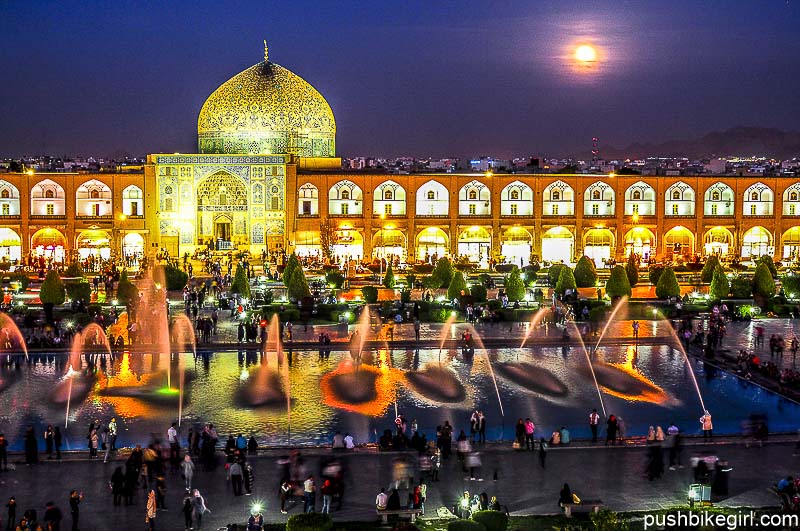
Nicolas:
I will answer this with an anecdote.
Back in 2006, I arrived after dark at a village in the Pashtun region of Pakistan. I had nowhere to sleep, but as usual, it didn’t take long for somebody to come with an offer for me to stay in his house.
While we were having dinner with the whole family, the man that had invited me told me that the Quran says that a guest is a blessing; therefore, they should be treated as such.
So, when somebody asks me this, I always answer the same: I love Muslim countries because, in them, I feel treated like a blessing.
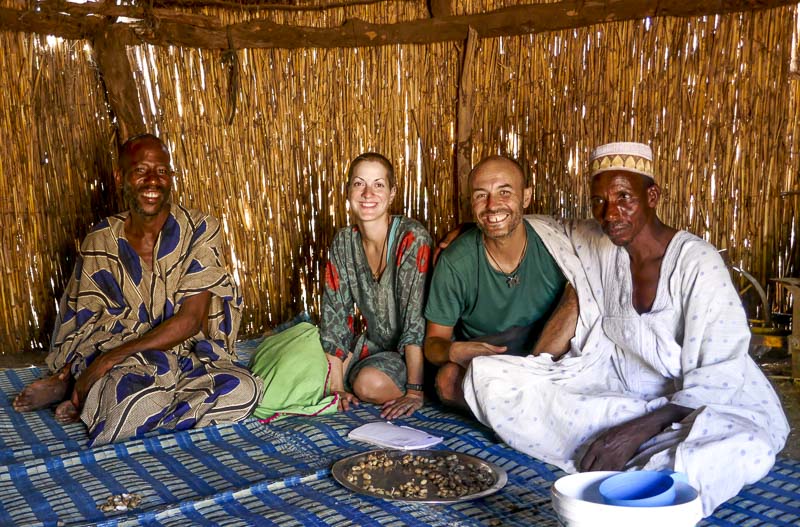
Rita & Fernando:
The Muslim countries we visited are very different between themselves, but if we had to choose a common thing we liked, that would definitely be hospitality.
The main advantage we found to being a couple was being more at ease, Rita received less male attention.
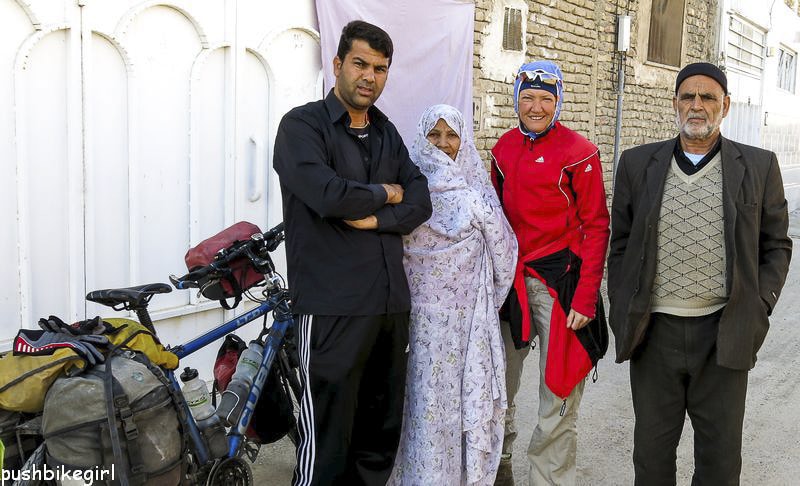
Heike:
It is amazing how people treat you as a guest in certain areas. In Turkey, Iran, and Morocco, I felt like a Queen or a celebrity.
I’m no threat to anyone. Sometimes I feel almost gender-neutral because I have no role I have to follow.
I have more rights than local women, and no one is expecting anything from me.
I’m not expected to follow cultural rules precisely. As long as I am dressed accordingly and behave respectfully, I am everyone’s friend and treated like a VIP.
The mosques are beautiful. I like the warm atmosphere in and around those religious buildings, where people sit together, talk, drink tea, or share a meal.
It is not cold and dark, as in many churches where you feel like someone is threatening you. Mosques are always bright, a lot of windows, never cold.
Sadly, as a non-believer, you are not always allowed to enter – depends on the country.
The tea ceremonies are a conversation starter – you are never alone in Iran, Turkey, or Morocco, where I felt more welcome than in any other Muslim country.
The unequal treatment of women and the restrictions imposed on them is certainly disturbing, but on the other hand, especially coming from Germany, it’s great to see how much the family members support each other.
Family always comes first. Parents, grandparents and older adults, in general, are given respect from younger generations.
I was also treated with respect most of the time. There is also support for the poor.
Something else I appreciate is no one ever tried to force Islam on me – in contrast to Christian areas where it happens far too often.
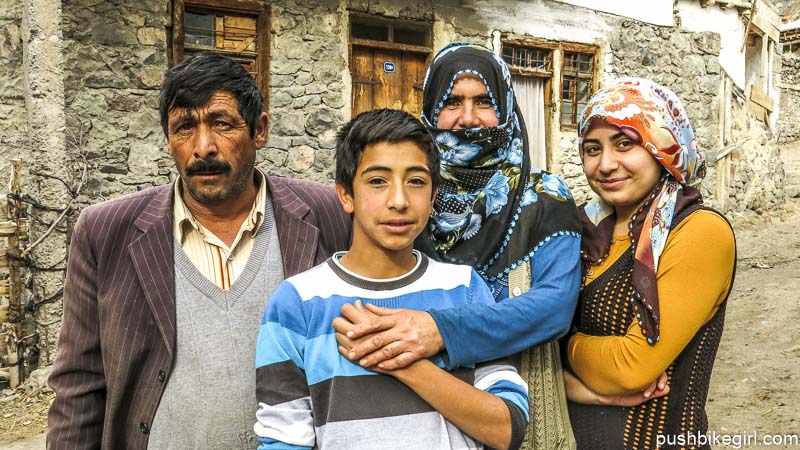
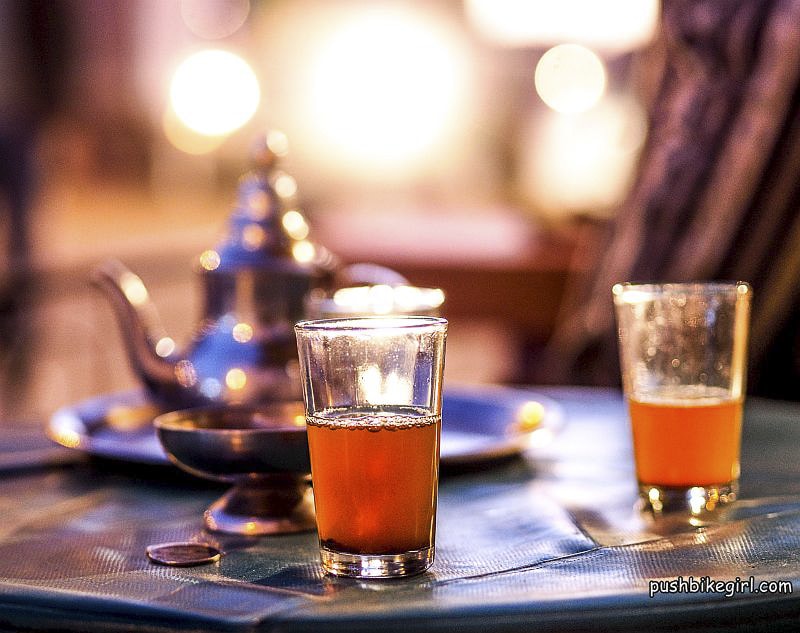
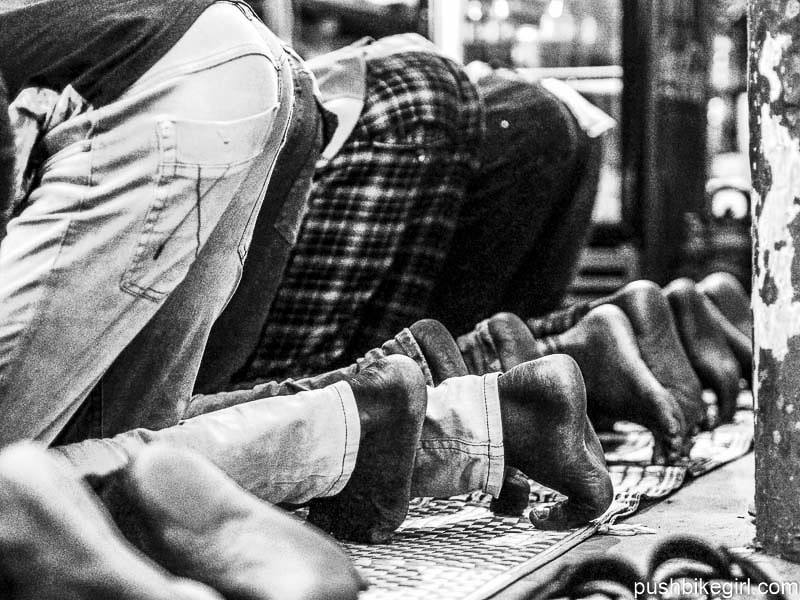
*DISLIKES / DISADVANTAGES*
Cindy:
As a western woman, I am emancipated, and thus, being in Muslim countries on my own has its restrictions forcing me to make adjustments.
If there is one thing I dislike, I would mention sexual harassment.
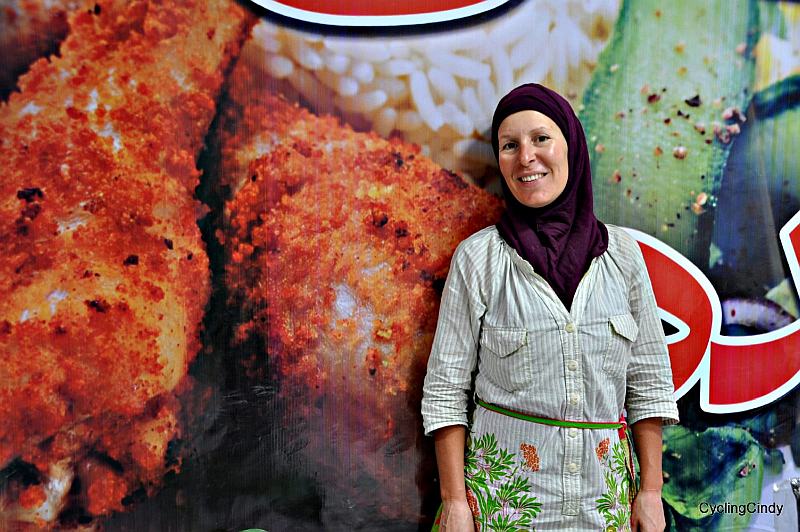
Well, of course, I had problems with men.
Isn’t it a natural occurrence that there is tension between a man and a woman?
It has to be. It is built-in: the energy between the two sexes.
That is why a local female in an Islamic country is always accompanied by a man (husband, brother, cousin, or son). And therefore, I had issues in every country, Islamic or not.
These issues range from mostly positive to serious harassment in countries where men are closer to the basic root of life.
I think it’s safe to say that the political situation of a country has a huge impact on its citizens. Taj Mahal in Agra is not the same as Lake Dal in Kashmir in the midst of a civil war.
Also, the definition of an Islamic country differs. Islam itself varies enormously, and so do the regions where it is practiced.
Add oppression among inhabitants, the level of peace, the leadership, the amount of tourism, past or present, and, not the least, your guardian angel.
I always say that Islamic countries are the best to travel in. I can now add that it must be mainly the culture that provides for good behavior.
Traveling for many years solo assures that not all experiences are positive, even in Islamic countries.
It can happen that my wealth, however toned down, arouses curiosity or greed. My loneliness can give the impression there might be an opportunity for a marriage or a visa.
And of course, since I’m traveling alone, I must be a loose woman!
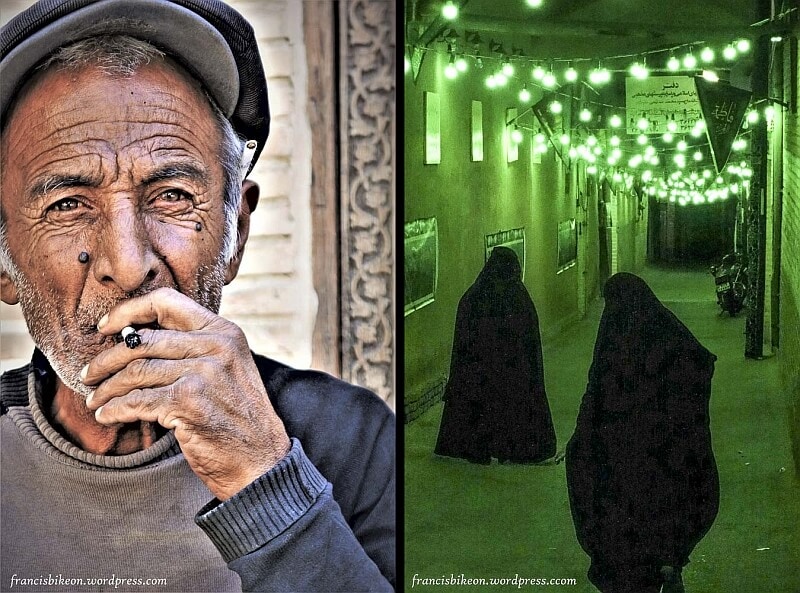
Francis:
It is difficult for me to know how to behave with women. I have to fake laugh when a man suggests that I take one of his female staff or neighbors for a fling.
It’s hard to know how to look at women? Sometimes, I feel bad for them being forced to wear hijabs in Iran, niqab in Arab countries and areas.
As a photography enthusiast, I don’t dare take pictures of women.
In Kazakhstan, I was hosted by a girl my age in her family home for a week. I never saw her boyfriend but he was suspicious of her and threatened to kill me if he found us together.
Often, I feel I’m being judged/defined according to my religion. Especially in Saudi Arabia where asking about your religion belongs in the top 3 opening questions.
I shouldn’t be too honest about my religious beliefs; I feel that not believing in God is often not an option.
Luckily, Christianity is well accepted although some people try to convince you that Islam is better (especially and maybe only in Saudi Arabia for me).
Prayer times can affect your schedule. In Malaysia, everything closes on Fridays at 1 pm; in Saudi Arabia, every shop close for 30 min 5 times a day during each prayer.
Some holy sites are not accessible to non-Muslims (Mecca, Medina, a shrine in Shiraz, Qom). Even for a man, dress codes can be awkward. Especially in Iran where wearing shorts is unacceptable.
Diet can be hard for vegetarians, or in contrast if you are one who misses pork! Ramadan can also be challenging (for me in Kazakhstan okay).
As a man, you are expected to drink vodka with locals in Central Asia. They insist, hardly giving you the right to refuse.
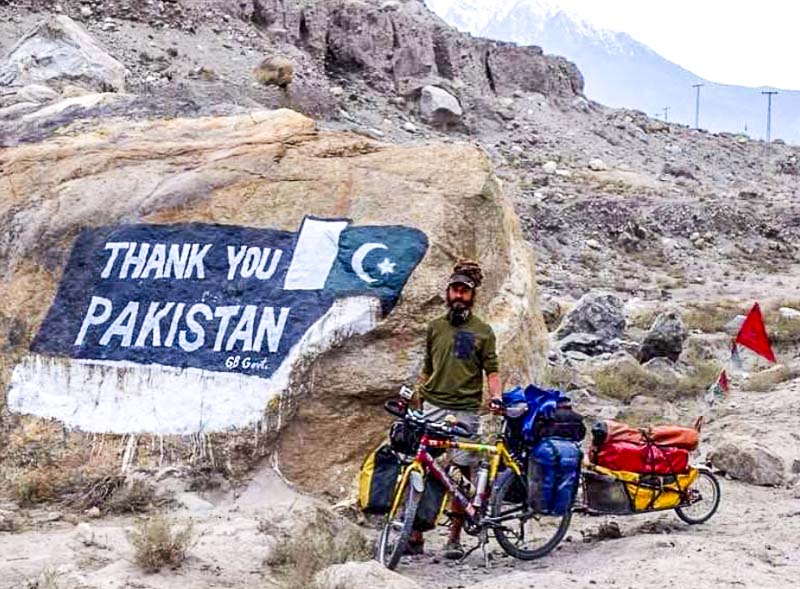
Katja & Miro:
We had very good experiences during our travels. Maybe the one big thing we disliked was there seems to be little respect for nature, it is very dirty, but this is the issue in many places around the world, not only Muslim countries.
The most annoying thing was that everyone wants to take selfies with us, not even asking if we are ok or need something.
Sometimes we would like to have just a little bit of privacy for example while we’re eating or when very exhausted.
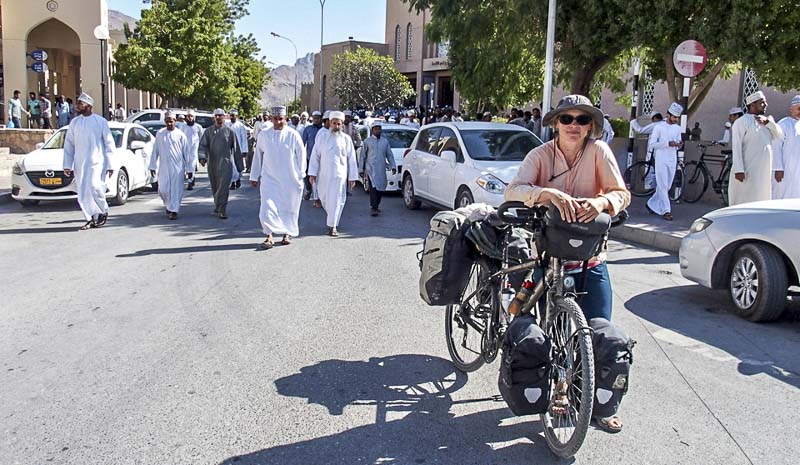
Ewa:
I didn’t like the cultural limits imposed on women. I became very touchy about this subject as it was new to me. I hadn’t experienced this in Buddhist countries, for example.
I really would be happy to see more women around. In many public places, there were only men, sometimes no women at all.
I felt ashamed going into a restaurant alone etc. as there were just men sitting there.
I had numerous propositions for sex, either directly or not, and the worst happened in Iran, where I was harassed and seriously attacked for sex.
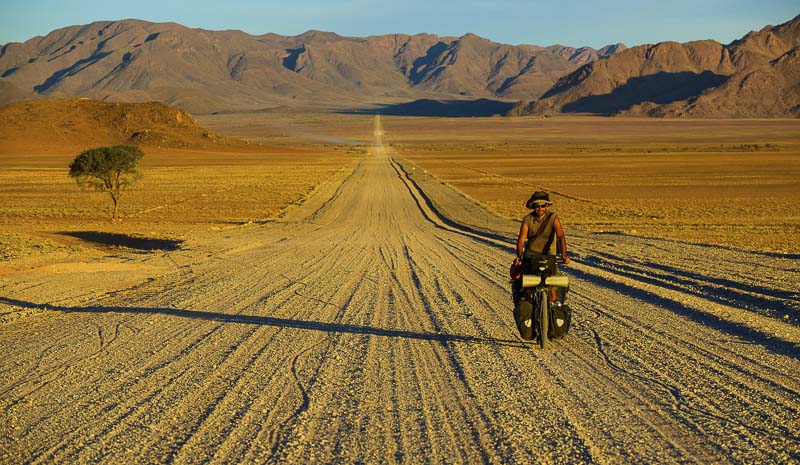
Nicolas:
This is very hard to answer for me because, honestly, I always tend to see the widest picture possible. In that sense, I think it is clear that there are good and bad people everywhere and that has no nationality or religion.
So, I wouldn’t say that I felt any particular difference in terms of advantage/disadvantage in Muslim countries as with any other country in the world.
Naturally, as a Westerner, I would prefer that men and women were freer to mix without restrictions. In some countries you don’t see any women on the streets, or you see them segregated, men on one side and women on the other.
I do respect their culture, and I don’t want to judge… I’ve heard and understood their reasons for it many times, so I remain tolerant instead of judging them.
I would also prefer that there was more freedom to dissent. For example, women should be free to choose whether to follow the dress code or not, and everybody should respect that and not enforce it.
I don’t mind it when women deliberately decide to wear a veil, but I don’t like it when they all have to do it because it’s a law imposed on everyone.
However, both of these things happen in some very orthodox countries (or ones that are ruled by a bunch of orthodox fanatics that distort the word of the Quran), but in most of the Muslim world, there’s a lot more freedom.
I did have a few sad experiences when I was traveling with my ex-girlfriend. There were times in Malaysia, Indonesia, and Egypt in which men groped her whenever I was out of sight for some reason.
The one in Malaysia was particularly bad and made me extremely angry. I must say that these were very isolated cases and she felt safe most of the time, taking the usual precautions and always adapting to the countries we were in.
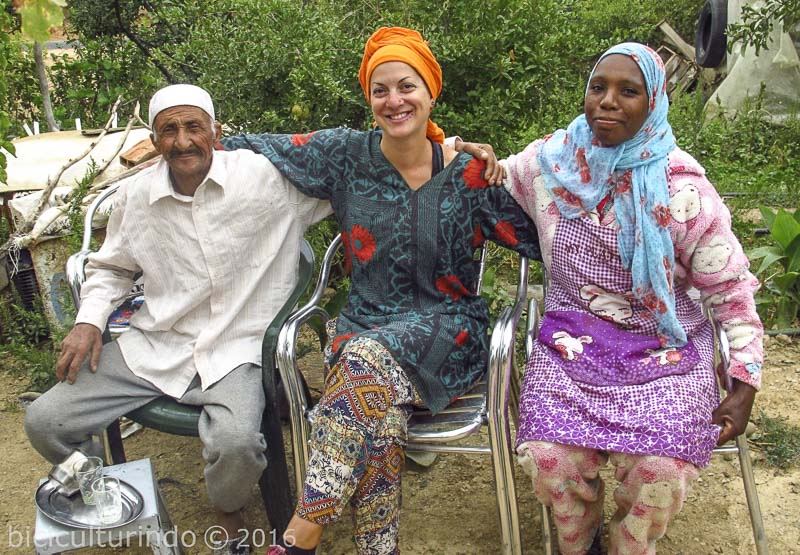
Rita & Fernando:
In Morocco and Mauritania, they were very insistent in trying to convince us to follow Islam, the one and true religion. They’d use the same kind of speech and questions to lead us where they wanted.
This problem followed us until Senegal when we were finally at ease to stop the conversation before it even started.
The gap between men and women is a bit disturbing as well, the lack of choice and voice women have – but we can’t say this is only religion-related, it’s a very cultural thing as well.
In Mauritania, we were shamelessly lied to, scammed, and ripped off. In Morocco we were almost scammed by a very aggressive guy who wanted money and threatened us (also shut me up, saying women had no right to talk to men in his country).
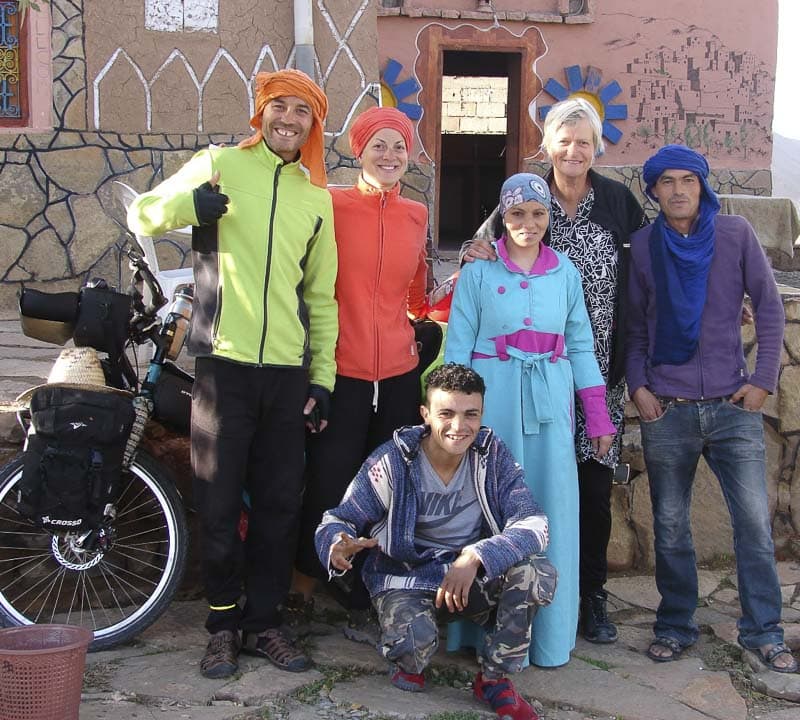
Rita:
Definitely those men’s looks in Morocco and Mauritania, stripping me down no matter how covered I was. That bit of neck was so enticing that sometimes I found myself hiding it with my hand while conversing.
One guy touched my bum while taking a photo. While we were staying with a family another guy tried to kiss me, touched my boobs and asked for sex when Fernando went to the toilet.
Another guy pulled my arm firmly for a while, trying to force me to get into his car – he wanted sex and was being very clear about it. Shouting out loud for Fernando saved me.
I also found it very useful and powerful to use the sentence “I’m married.” I’m not sure this has to do with “Muslim countries” or just cultural.
I refrained myself from being too talkative or showing my vibrancy. In Mauritania, there was the added constraint of being asked to wear the “melfa” – the typical women’s whole body and head wrapping scarf – while temperatures were above 40c, and I could barely breathe inside of it.
Annoying too was almost daily being offered liters of an extremely sweet drink used to force Mauritanian women to put on weight – but this is culturally related, not religious.
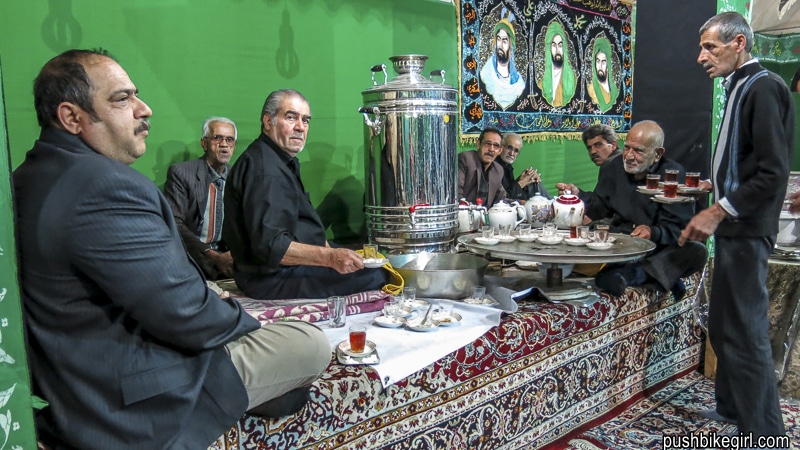
Fernando:
It took me some time to get used to and deal with the somewhat aggressive tone of Arab men. It sounded aggressive to me, but it’s only their normal way.
Having to worry about money issues: although bargaining is part of the culture, it became sometimes tiring, especially having never to forget to ask the price before ordering something to avoid the sure price increase.
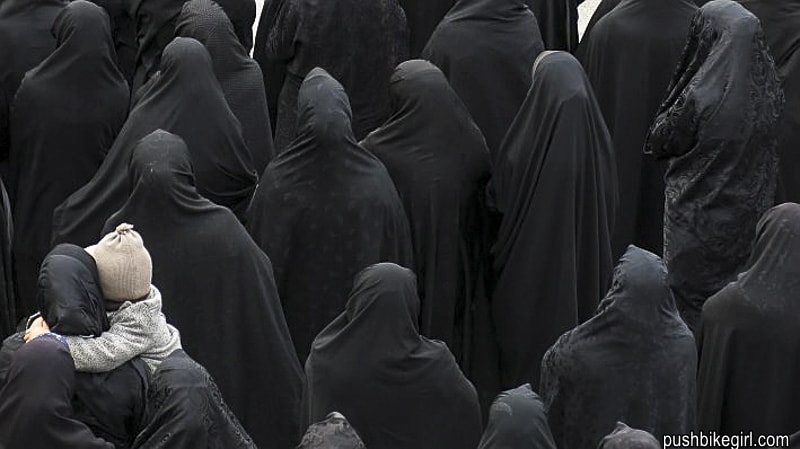
Heike:
It is hard to observe how restricted women often are, such as women not being able to leave their parents’ home until after they get married. In many places, they are not allowed to go anywhere without a male family member.
Young people are frustrated. Men are sexually frustrated because of all the restrictions they are facing regarding women.
People are often not free in their behavior, but that, of course, depends on which country and which area of a country. It differs immensely throughout the Muslim world.
There are powerful gender roles that you are unaccustomed to and have to face as a traveler, and it can be tough to act accordingly and not make mistakes.
Yes, I had a few tricky moments. Mainly in Turkey where I was chased and beaten by motorbike riders, I had to face an armed robbery (funnily at that moment I was riding with a Spaniard), several times truck drivers stopped and asked for sex or kids threw stones at me.
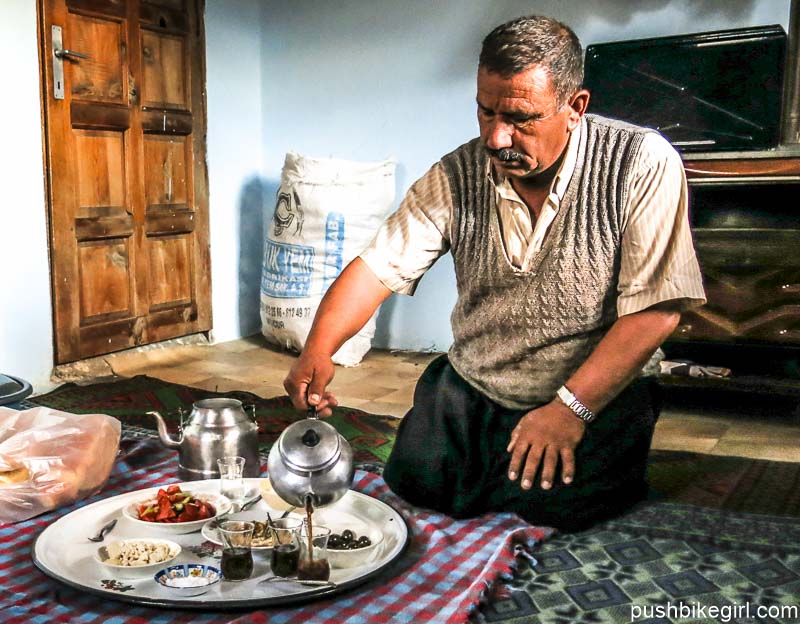
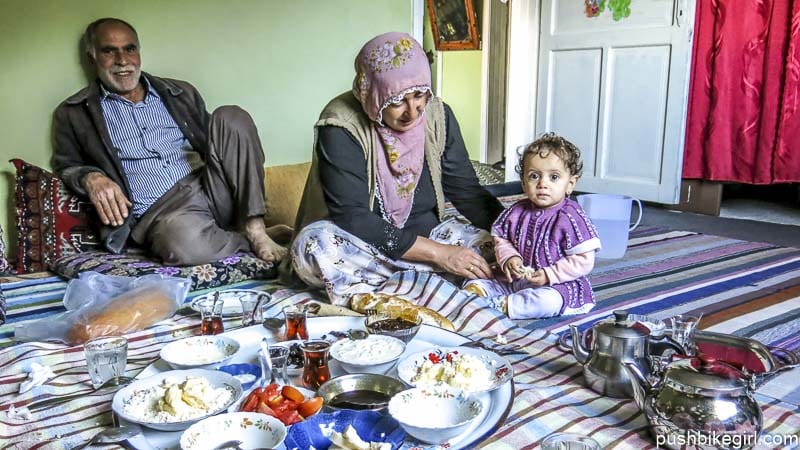
**INVITATIONS**
#Solo woman
Cindy:
Islamic countries follow the main rules and most known oral traditions of the Hadith and the Quran, leading Muslims to offer invitations to strangers, as they want to welcome travelers and treat their guests as well as possible.
But this may depend on culture as much or rather than being a Muslim. Historically the Middle East has been known for its naturally hospitable people, and this had nothing to do with Islam as Muhammad had not been born yet.
It’s my experience that openness towards the stranger starts in Turkey and comes to an end once in India.
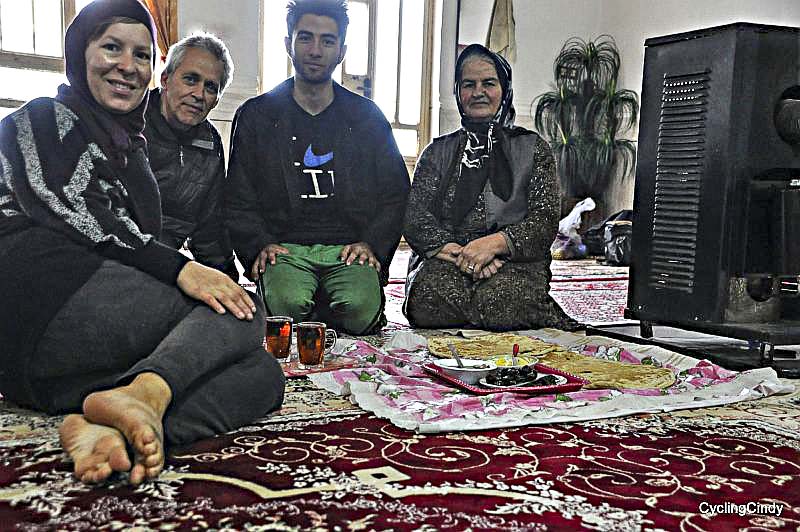
West Chinese Muslims are no comparison to, for example, Kurdish Muslims. And so, in some countries, I was invited non-stop while in others to a lesser degree.
There didn’t seem to be any rules as to who invited me, but more often, a man as they are more prevalent in public places.
There are rules once inside someone’s home.
Naturally, behavior with men is very different than towards a woman. A man is not supposed to sit close to you nor to look (too long) into your eyes while conversing. He is not to touch you, shake your hand, or hug you goodbye.
It is the woman who will prepare and serve your food; she will show you your place to sleep or join you for night.
The general rule is that men keep a distance once they have accepted you in, or invited you over. Women, on the other hand, will open up and treat you as a sister or daughter.
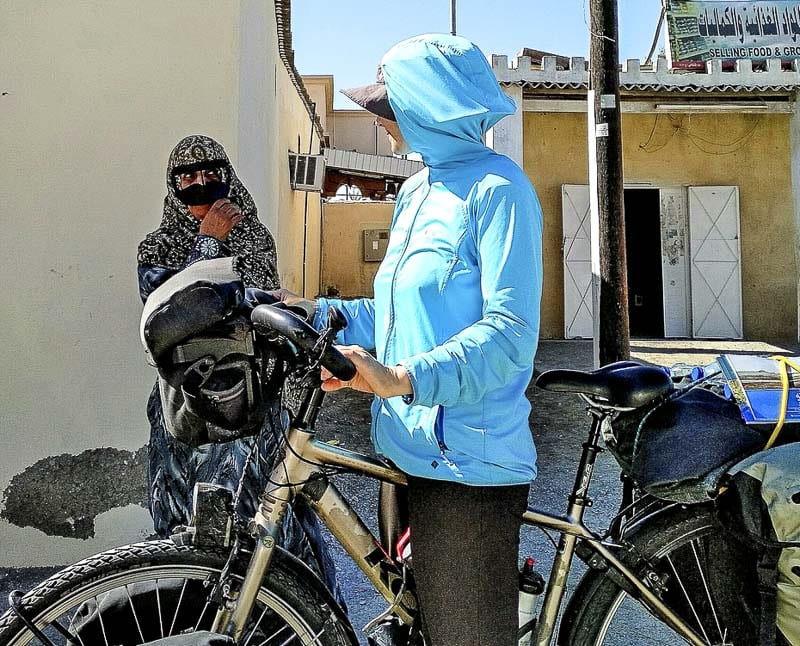
Ewa:
Funny – no, actually, I haven’t been invited very often, even in Iran (at least not like other travelers tend to say – simply by being picked up off the street).
But, I am not easily invited. I tend not to seek shelter in people’s homes. I’m sure I would be invited more often if my approach was different.
As a guest, you might feel like a king or queen, but as a woman you will most likely spend your time with the women.
That is different, of course if you stay at a host from Warmshowers or Couchsurfing, who may have a less traditional approach. I was well taken care of.
As a female, I wouldn’t accept invitations from men that live alone. But I stayed at Couchsurfer hosts that live alone with no problem – only those that had references.
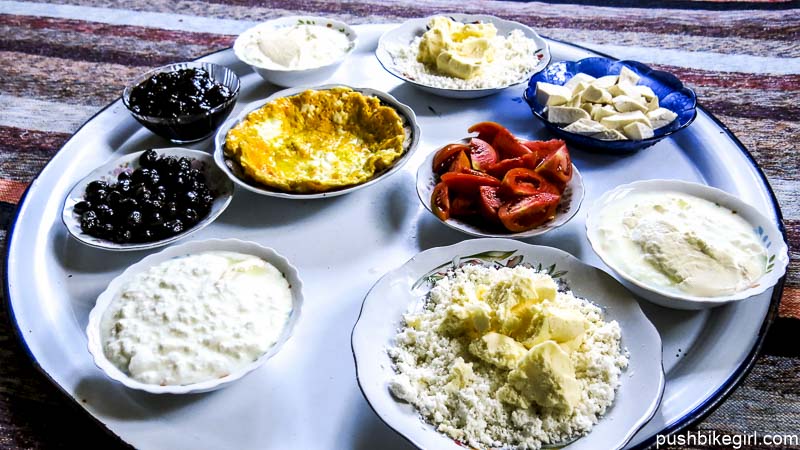
Heike:
Uncountably often. Sometimes even too often.
In Iran, for instance, people are super friendly, but sometimes they almost treat you like they own you.
Then it gets a bit too much, and being a polite guest like I usually try to be, it can be tough to answer questions and eat and drink tea until the wee hours, when you know you need some sleep so that you can cycle on the next day.
This shouldn’t be taken as a complaint, more so as an explanation that being invited every night is not just fun, it is also somehow your task to entertain the host – every night anew.
There are also situations where they invite you and offer you food and tea and a room for yourself and leave you alone all night, and this can even feel strange because you would have at least liked to share a meal with the family.
Every region is very different.
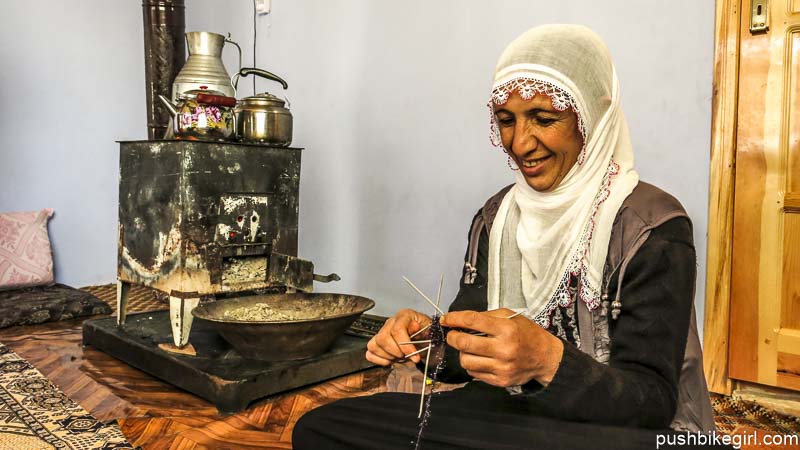
Invitations came from both genders. In more conservative areas, most often by men. In less strict areas equally by men and women.
Sometimes women stopped me and said they would like to invite me, but they needed to ask their husband or father for permission first.
Most of the time, I sat with the entire family. Women are preparing and serving the meal. Men most often the tea. Women are frequently very welcoming and open and treat you like a sister or a daughter. I also had moments when I sat only with women and men disappeared for the whole evening.
Men are often reserved in their approach; the older they are, the more respectful. I regularly had the feeling they enjoyed talking openly to me.
Younger generations seemed happy to have the chance to talk to a woman from Europe, and I hardly ever had the feeling it was about sex because the guys were often 20 years younger than I.
No, it was more about getting to know my gender a bit better, knowing they have nothing to fear when they talk to me and ask questions.
Those are also the times when you realize that men are also suffering in conservative areas because they are restricted to only having contact with men.
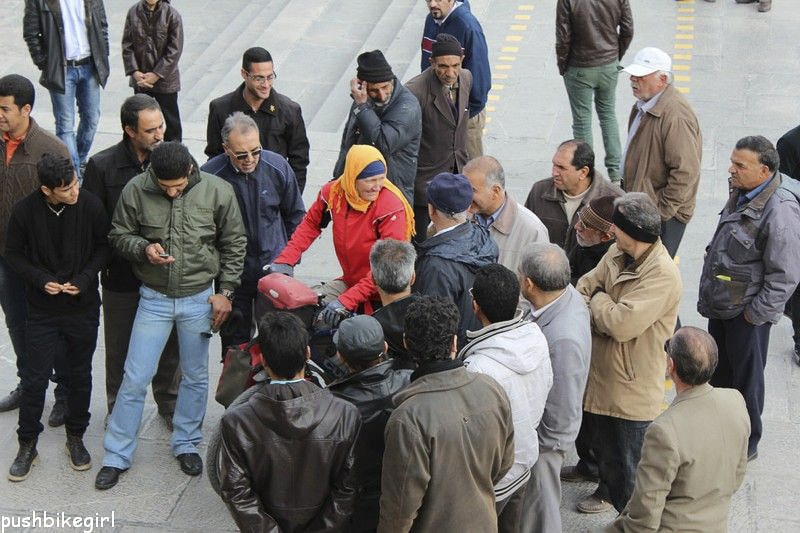
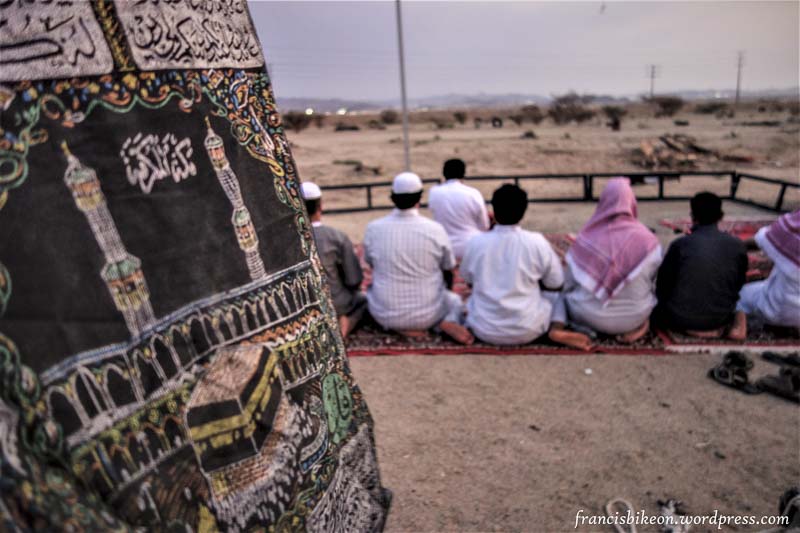
#Solo Man
Francis:
I’m invited in often, especially in Muslim countries.
In Central Asia it’s often to share a meal or vodka ?, calling me as I’m cycling, or from another restaurant table.
Hospitality reached high levels in Iran and Tajikistan (especially Pamirs and especially Bartang Valley where you must hide behind bushes if you want to make any progress!) (traveler’s problems ?)
These societies are very patriarchal and the man plays the leading role, deciding to invite you while asking the woman to prepare tea or food (which sometimes I can feel slightly guilty about).
Sometimes I ate with the whole family, the man doing most of the talking. Sometimes only with the man face to face.
To make everybody feel comfy I try to include children and women in conversations. After a short time men often gave me the impression they felt closer to me than to their wives (Saudi, Sudan).
Some men are protective towards their daughters (“never touch a Muslim girl”), but in contrast sometimes fathers jokingly ask you to take one of his daughters with you.
In Saudi Arabia I never met the wives, sometimes never saw them. I was often offered a separate room for sleeping but also for spending the day. Food served three times a day.
Sometimes people are afraid of me, while others in countries with more tourism they think I’m brave.
In Saudi Arabia, people were amazed and thought I was either poor or crazy (I was literally asked if I was poor or crazy), and every day drivers stopped to give me money!
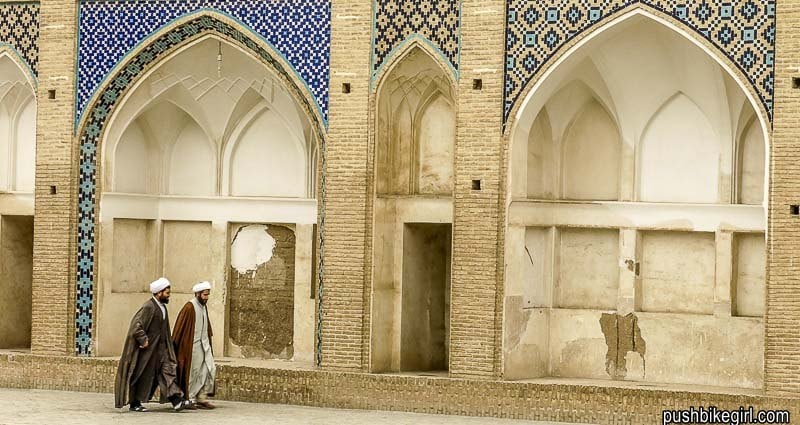
Nicolas:
I was invited all the time, it would feel extremely weird when I wouldn’t get an invitation if I spent more than an hour in one place. People were never afraid but exactly the opposite.
There was no problem at all to come into contact with women. Obviously, it is a more shy and distant approach, it’s not a hugs and kissing one like the one we have in South America, but it was never really an issue, except for a few specific cases.
There wasn’t a big difference between the contact that I would have with the women in a traditional Muslim family and with the ones in any other place.
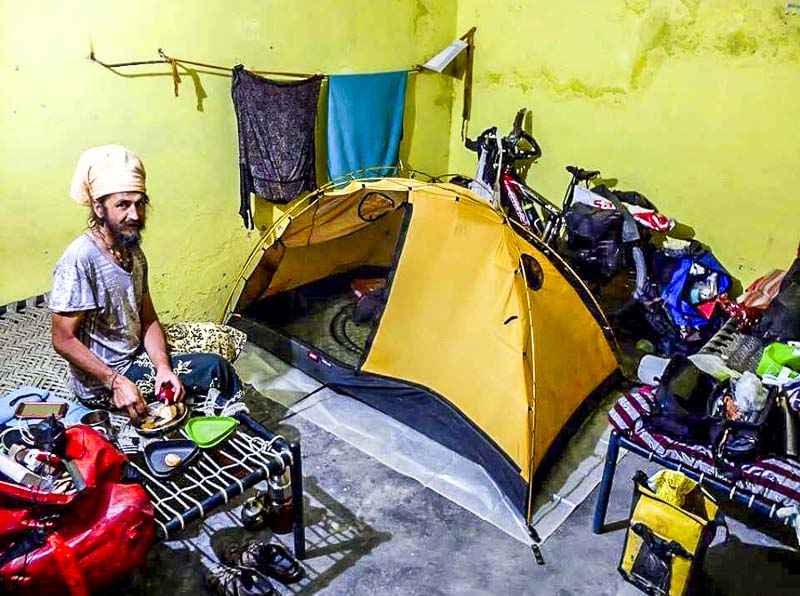
#As a couple
Katja & Mirco:
We were mostly treated as part of the family whenever we were invited into a home. We got to know all the family members, which in most cases is half of the village.
After a hard day of cycling when all you want to do is go to sleep it’s a bit hard but also beautiful.
I wouldn’t say that we were treated differently in different countries, but more on how religious the family is.
Mostly we met very open-minded people, which was very nice, so we could share ideas and learn about places we were visiting.
They say: “same attracts the same.”
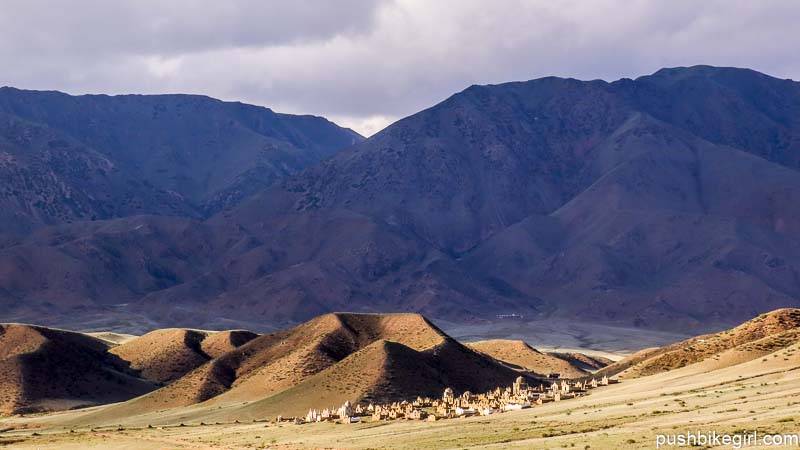
Katja:
We also experienced staying with very religious families, which were a special experience for both of us.
Miro could only stay in a guest part of the house as he was not allowed to meet the women, and I could wander around the house and meet the mother and all the sisters, so I felt very privileged.
I could wander in the parts of the house only women can go and her closest family members.
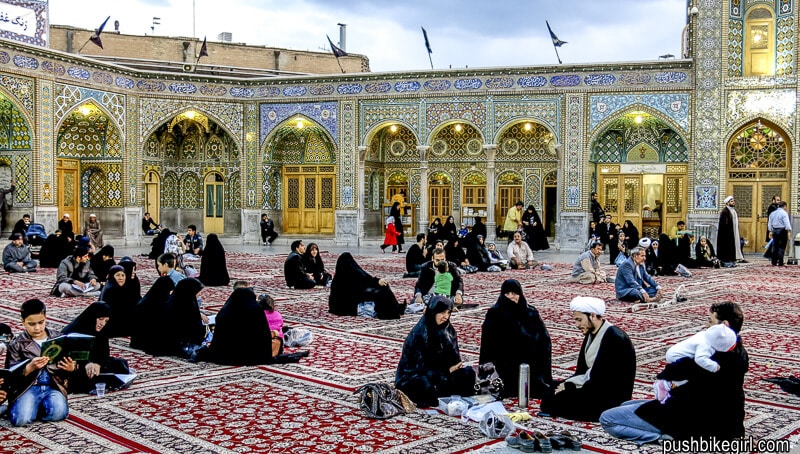
Rita & Fernando:
We were usually very welcomed by everyone, be it men or women.
It was clear that being married got us always some extra points as we were immediately more respected and sometimes admired for that.
Having said this, we had some situations where women were not happy having us in their home, cooking for us, and generally serving us at the demand of their husbands.
We can say that most of the time we were very well treated no matter the country we were visiting when we were invited.
What differs is the amount and frequency of invitations, and that was quite different between these countries.
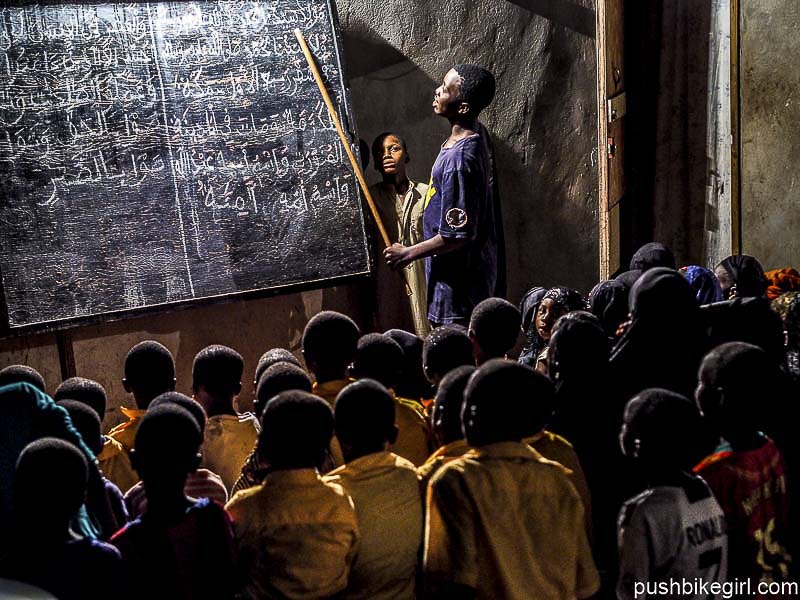
*QUESTIONS & INTEREST*
What did people ask you – were they interested in you? Do you think that your presence might have left an impression on them?
#solo woman
Cindy:
When communicating, the first questions are always whether I am married, whether I have children, and how old I am. People are hugely interested in a species doing something unimaginable in their minds.
When language allows, conversations usually included topics such as basic human needs and politics. Although having absolutely no common ground trying to discuss life could become pretty abstract for them.
We often only exchanged pleasantries, I marveled about the food or praised their live-stock.
I think I leave an impression on people, even only if it’s that I did something as odd as cycling through their country.
I do hope I left two major impressions, though, one: that I am not the loose woman I appear to be and two: that I’m not trying to press emancipation onto the women of any Islamic country.
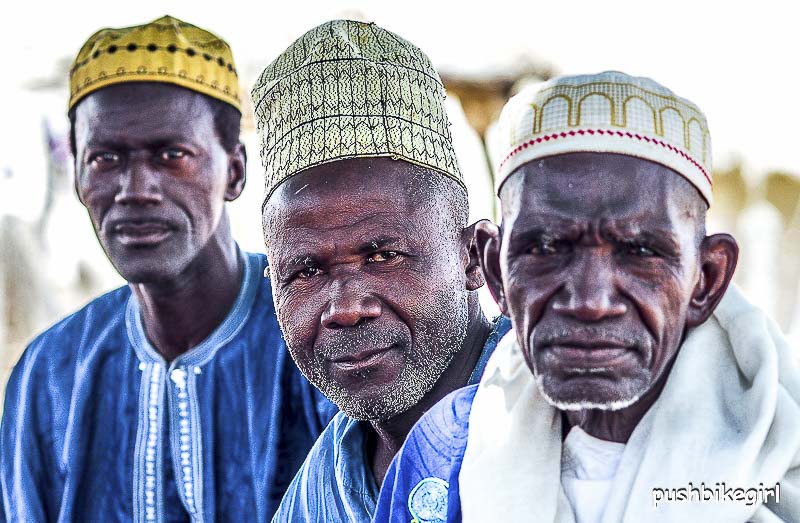
Ewa:
Of course, they were interested in me and I’m sure I’ve left my mark in their lives too, even though they would not understand what I was doing or why.
The first question would nearly always be – where is my husband and if I had children. It is unbelievable for most Muslim people, the traditional ones especially, that women can be alone, travel alone, etc. and without having my own family I sensed they felt sorry for me.
Most often I felt as if I came from a different planet.
Of course, it is a bit different when locals have more knowledge about the “western” world.
Sometimes they would ask about money for traveling and living.
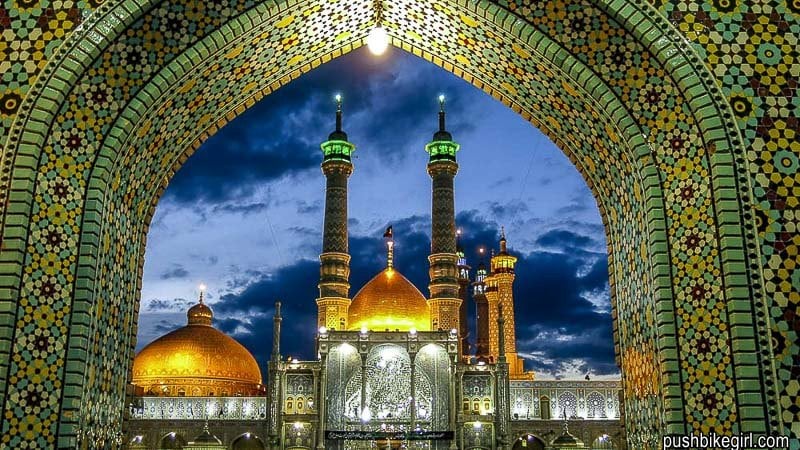
Heike:
Yes, I am asked the same questions like where is your husband, why are you solo, how many children do you have? How old are you?
I get those questions all over, especially in the lesser developed countries. I’m also frequently asked how I like the food in their country?
Common questions from the men are, can I take them to Germany or will I accept their marriage proposals. (Especially in West Africa)
I think in Iran and Morocco especially I had the feeling that women were impressed that I was brave enough to go out on my own. When I would tell them that the world is not such a dangerous place as we are always told, they were often surprised.
Most of the time, women wanted me to stay longer than only one night. I brought the outside world into their homes, and I often had the feeling they wanted to know more about what’s out there.
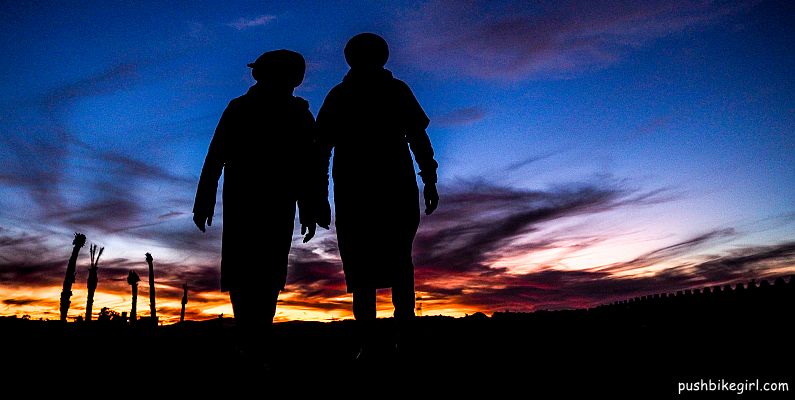
Francis:
People ask about my age, my religion, my country (sometimes also how to get there), my family, my job, where I’m going and where I came from. Many see me as a strong and brave person.
Many ask how I see and saw their country before coming. Especially in Iran, people are concerned about bad media coverage and seemed dedicated to restoring their image through you, which could partly explain why they are so hospitable.
I feel like I have an impact, especially on bicycle enthusiasts dreaming of doing the same.
In Riyadh, I met the growing bicycle community, and they listened to me with great interest and respect. Some other bicycle enthusiasts from poorer countries wish to imitate me, but it’s much harder for them to have the money and a passport.
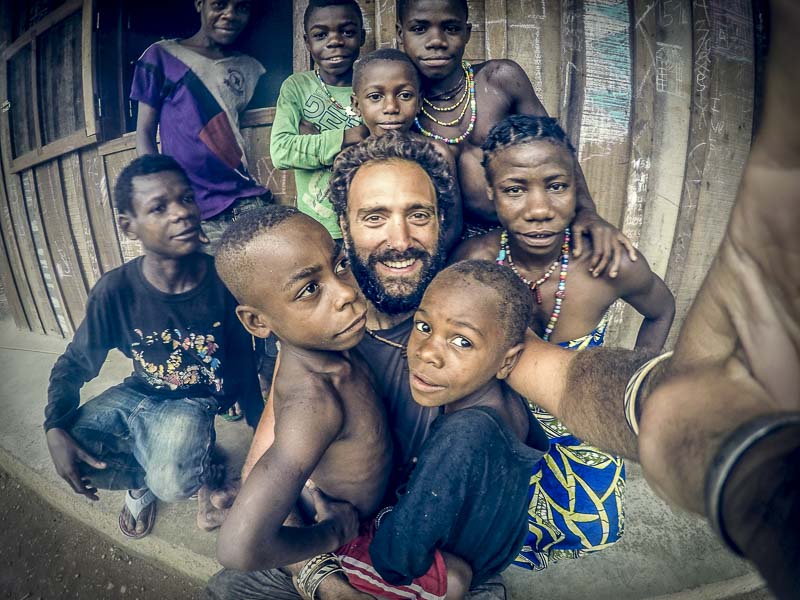
Nicolas:
This also varies dramatically between countries. In Iran or Indonesia, to name only two, they see you almost like a God.
I find this very funny, but I also adore the humility they have. Curiosity is a constant and Muslim people are always very curious and willing to hear your stories and always invariably willing to help you in any way.
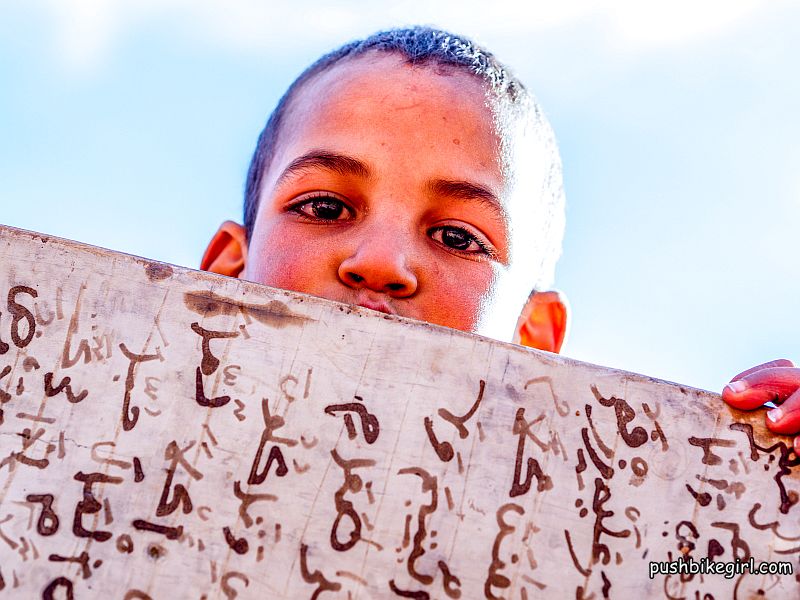
#as a couple
Katja & Marco:
People asked where we came from, where we are going if we are married, and have children.
They are mostly quite impressed to see you on a bicycle. In some countries we were asked if we don’t have motorbikes in our country.
I know we inspired a lot of people we met; they saw that there is another way of life possible and not just the one they were told to live.
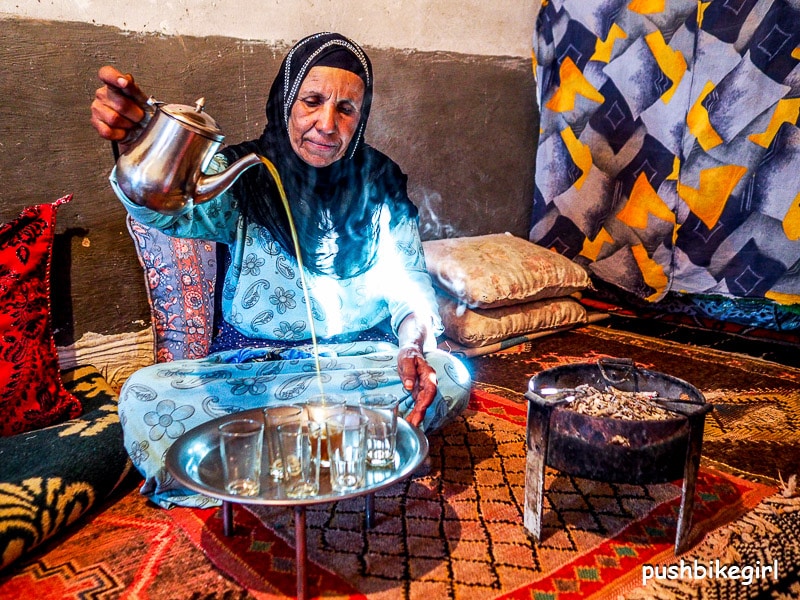
Rita & Fernando:
The two real Muslim countries we visited are very different from each other. In Morocco people seemed interested in us, they always asked us the country we were from, if we were married if we had kids, and if we enjoyed their country.
Then if the language allowed, they would ask the reason we were cycling their country and also about our religion.
We had very often long conversations about many things, and we genuinely think we left an impression on many of them.
We think they saw us exactly the way we were, a couple on a bicycle exploring their country.
In Mauritania we didn’t feel they were interested in us, and we doubt we left an impression on anyone at all. We felt like something else than just a simple exploring couple: “possible tourists with money who could be taken advantage of.”
There were genuine invitations as well, but we didn’t feel much interest even then.
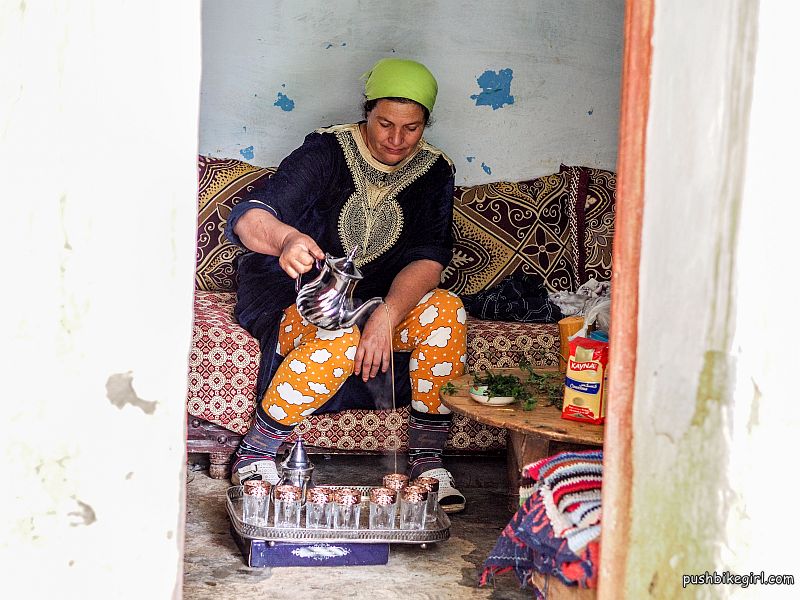
*On the streets*
How was the contact with local people on the streets daily?
Cindy:
Contact with men, on a daily base, out in the streets, varies tremendously.
Without going into detail, it differs as much as 5 fingers on a hand, ranging from perfectly respectful to plain harassment, with indecent sexual proposals in the middle.
Contact with women is hardly ever bothersome, exceptions of theft aside.

Ewa:
You usually do not see woman outside, or at least not that often (it varies between countries).
I felt stared at and most of time, I did not feel comfortable. On many occasions they laughed at and/or followed me, which was super unpleasant.
Contact with women was usually good, friendly, but sometimes I felt (central Turkey, for example) that they were distant and not happy to see me. I felt they treated me like an “easy” woman.
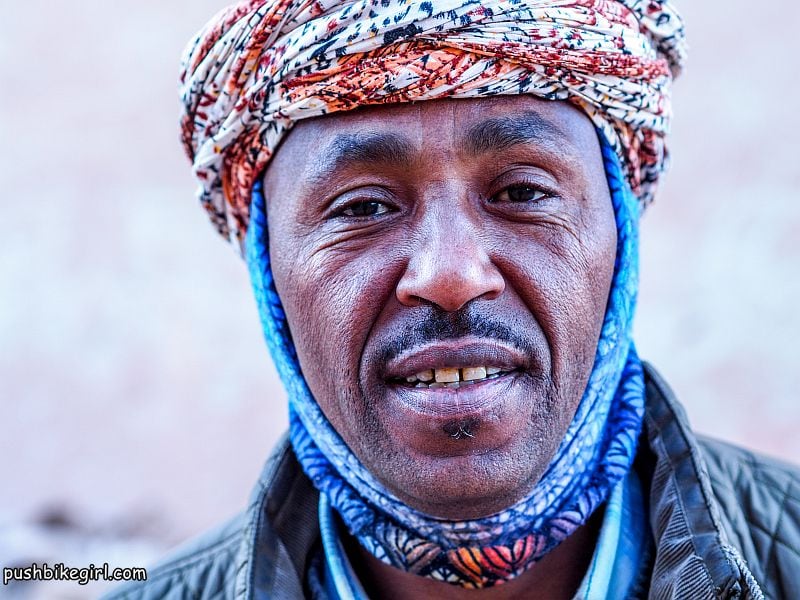
Heike:
Besides Turkey I hardly ever had any issues with men. I am almost always treated very respectfully especially from older men. Younger boys between 15 to 25 can be annoying, especially on their motorbikes.
All in all, I was able to make contact easily and felt safe and welcome almost everywhere.
Yes, there can be situations where men ask you for more than just having tea together, but I had those situations outside the Muslim world too.
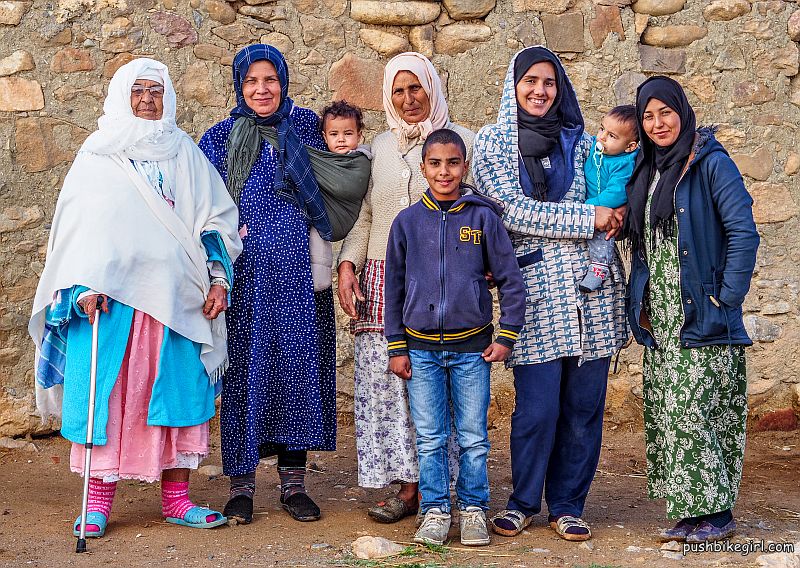
I treat men with respect, I am friendly, and this is what I get in return.
I also show them that I am not afraid, and I assume my body language also tells them I am willing to step up for myself.
A man in conservative countries is often not used to a self-confident, tall woman and I believe this gives me a big advantage and respect. I am also not the youngest any longer which is a big help.
The good thing is that in most Muslim countries (exception is Central Asia), there is hardly any alcohol and fewer dogs (besides Turkey), and that makes those countries very safe right from the start.
Contact with women is very easy and loveable. Never jealous or awkward in any way. Muslim women adopt you once you enter their house; it is a pleasure to experience it every day anew.
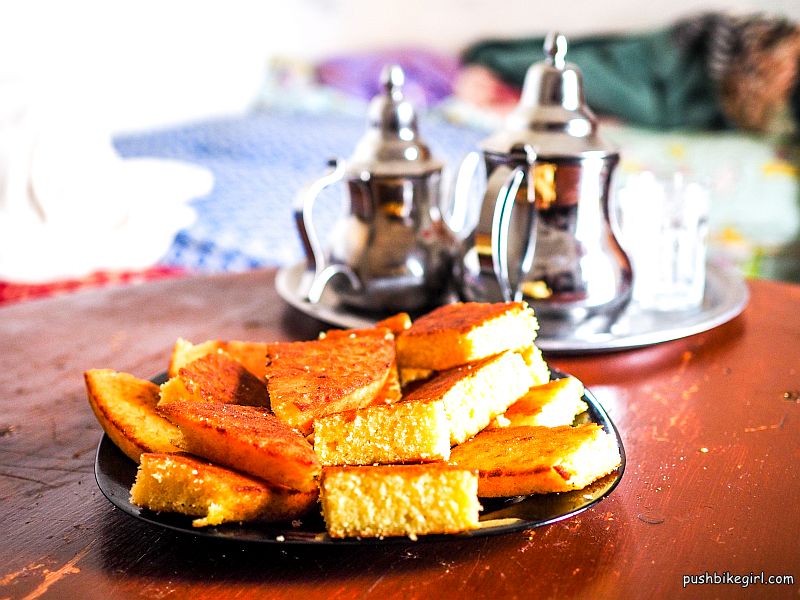
#solo man
Francis:
Many people wave and call out to you, there’s much more interaction than in western countries.
Depending on the areas I was often spontaneously invited more or less to share meals, especially in Central Asia and Iran. Saudi Arabia is impressive as everyday men stop their cars to understand what you are doing and give you money.
In Iran they stop to give tea or fresh fruit.
Contact with women is often limited to shopkeepers or restaurant staff.
While riding I am cautious to wave at women for fear of making their men jealous, I don’t want to be suspected of flirting.
In Saudi, younger women are starting to address men in public. I feel very uneasy about it even though I’m told nowadays it’s fine.
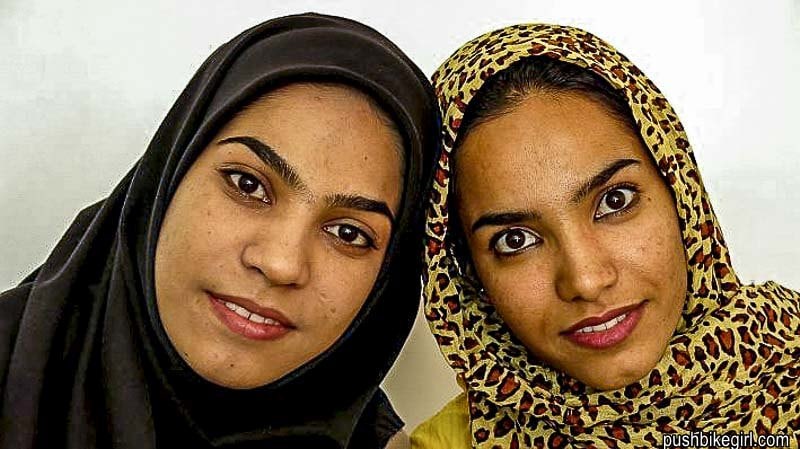
Nicolas:
I find contact on the streets perfectly fine. Men are always respectful and welcoming.
In some Muslim countries there’s no difference between approaching men or women, like in Indonesia.
In others, women are a lot more reluctant when approached. Sometimes they prefer to avoid contact altogether, like in some parts of Pakistan.
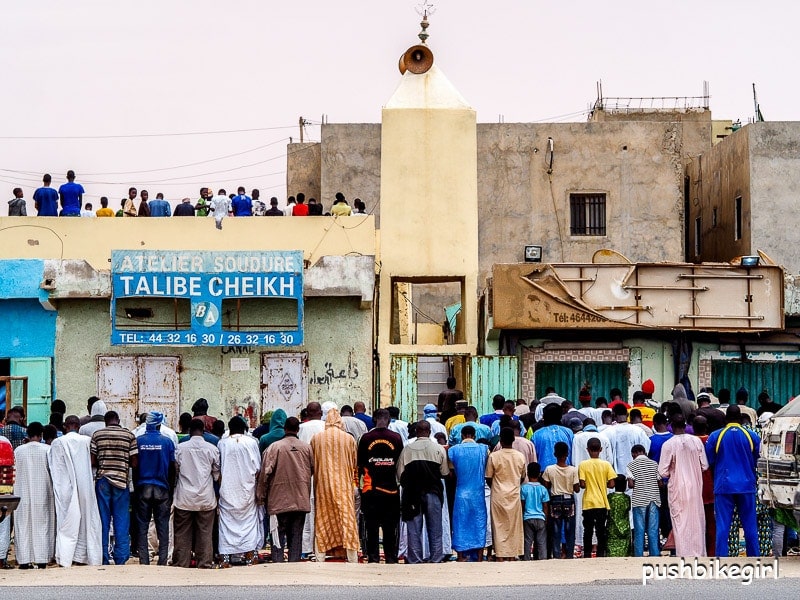
#Couples
Katja & Miro:
On the street people mostly talked to both of us. Sometimes the women would ignore Miro, and sometimes men would ignore Katja.
The only thing we do differently in Muslim countries is we don’t show so much affection to each other in public.
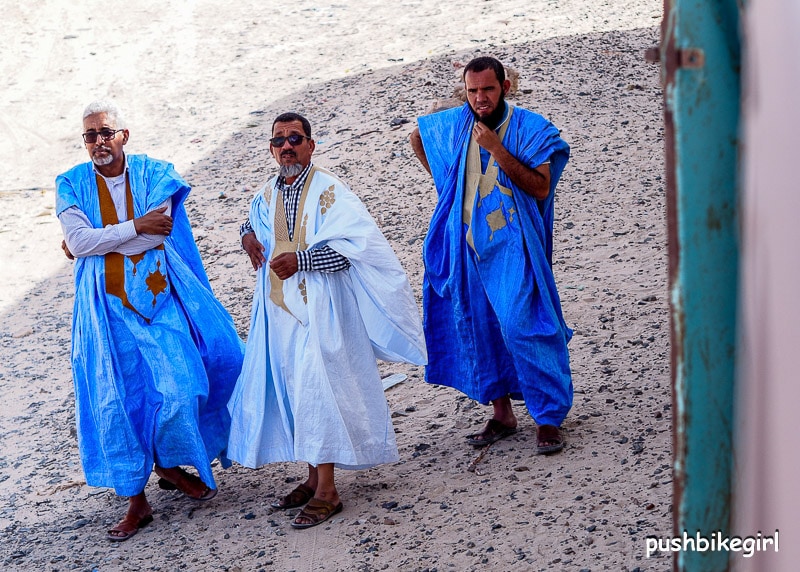
Rita & Fernando:
There’s a huge difference in how different genders treated us.
Fernando could be at ease all the time while Rita was often stripped down by the men’s looks and the very few times she went out with no scarf on the head, then women would stare at her very intensely.
Women usually don’t address anyone on the streets, but if they happen to do it, they would always address Rita. Men always addressed Fernando.
We refrained as much as possible from showing public affection, and Fernando would take the lead in conversations or asking something on the streets.
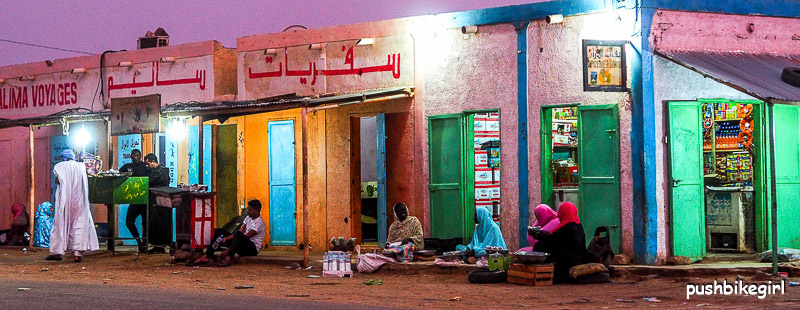
*SEXUAL HARASSMENT*
What rules did you follow to reduce the risks of sexual harassment?
Cindy:
To reduce the risk of sexual harassment, I go by a few rules.
I choose not to camp when I feel it is too risky and I select main routes to cycle. I dress up long sleeves – long slacks. I cover my hair, and when possible, I dress as the locals do.
Yet, being a solo female is already reason enough to assume I am sexually not strict. I reduce this risk further by not smiling at men or groups of men. I avoid eye contact.
I am not frivolously greeting every passerby, nor waving like a happy prostitute.
When I am in a hotel, I close and lock doors. I make sure if I leave the room, I am fully covered, even if just to the toilet.
If I am posing for a photo, I do not allow an embrace.
I will only stay with a family if there is an actual family.
When seeking shelter, there must be evidence of a female presence. I avoid being alone with only one or two men, but groups are usually safe even when there are one or two rotten minds.
Sometimes the only way to reduce risk was to fight and complain about perverseness and exhibitionism. But these happen anywhere.
When drivers stop to harass you I find keeping your cool while writing down their license plate number to be extremely effective in deterring them.
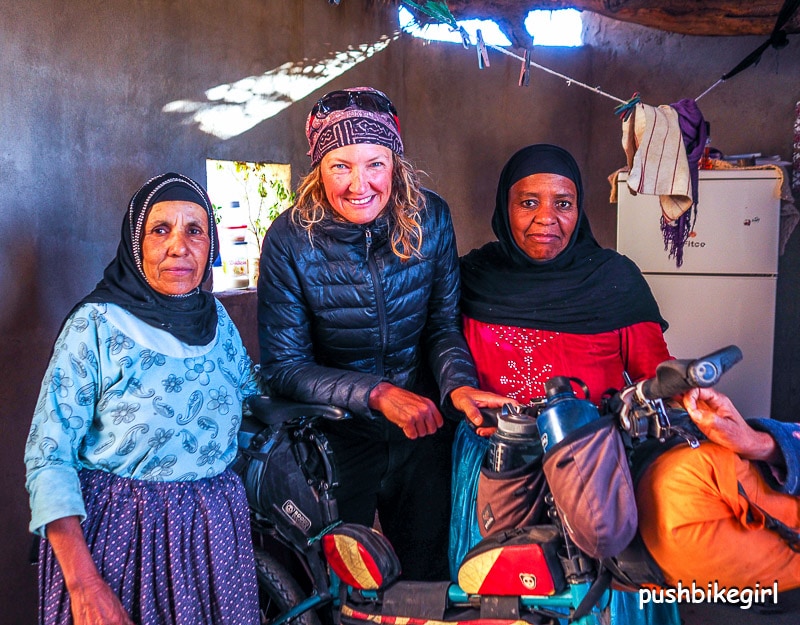
Ewa:
I cover my body head to toe.
In Central Asia I got away with wearing loose shorts and long-sleeved shirts, but later in the Middle East I bought long pants, and wore them for the rest of my journey – that is Oman, UAE, obviously Iran, Azerbaijan, Georgia and Armenia (not Muslim, but that was better) and Turkey.
Loose clothing that doesn’t show your form work well.
Apart from that, I would not be too friendly with men and don’t accept invitations unless they are with female.
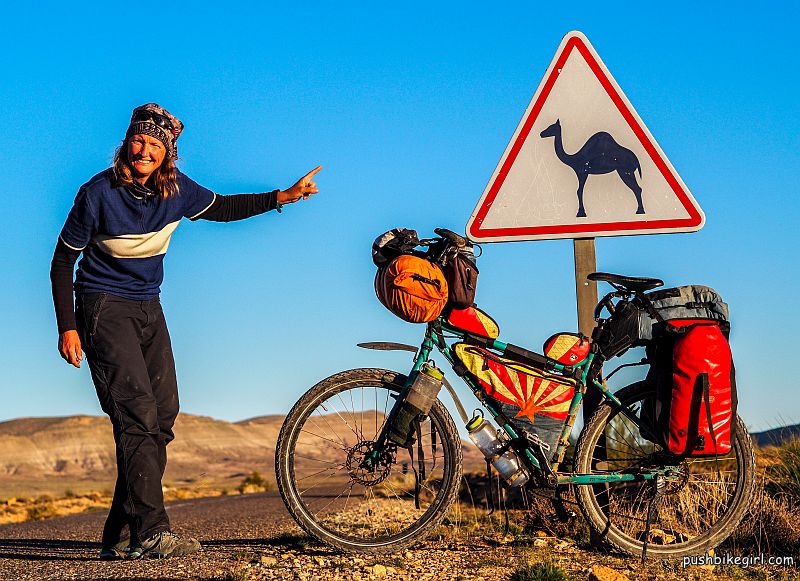
Heike:
I am always dressing conservatively. Long pants most of the time, long sleeves. Besides in Iran never a scarf – but a baseball cap ?
In Iran I dressed like a man.
It was winter, so I was able to wear a beanie and a men’s jacket, so a lot of people thought I was a man which gave me some protection, I think.
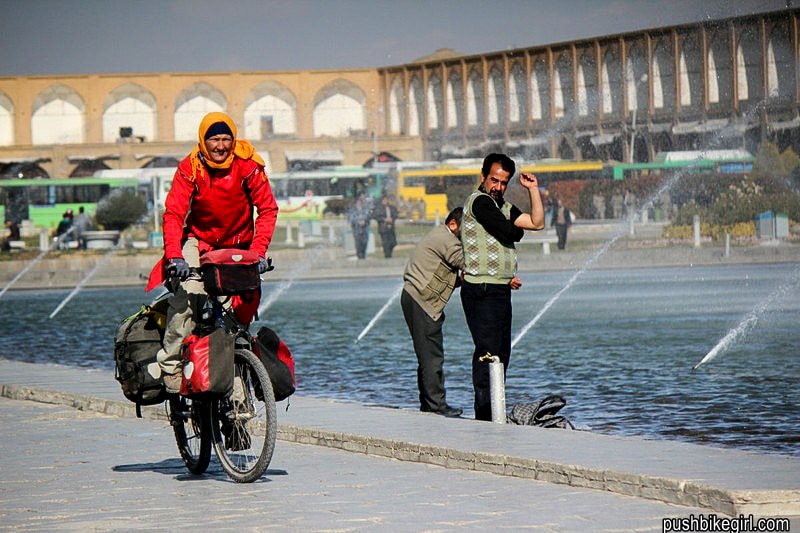
In the very conservative regions of Turkey, I ignored men and their extreme looks – in Iran I was careful and waited to see how men acted towards me and then decided how to behave in each situation.
In general, I am open and friendly, I wave and say hello to both genders and act like I act everywhere else and so far, this worked out very well for me.
If a guy wants more than just being friendly I tell him straight out to bugger off – if necessary, in a loud and unmistakable way that everyone around notices what is going on.
Usually men are not used to this response and walk away.
If I don’t feel safe, I stick to the main road, so I make sure there is always someone to ask for help if necessary.
In places where motorbike riders are annoying, I switch to the wrong side of the road where they can no longer bother me.
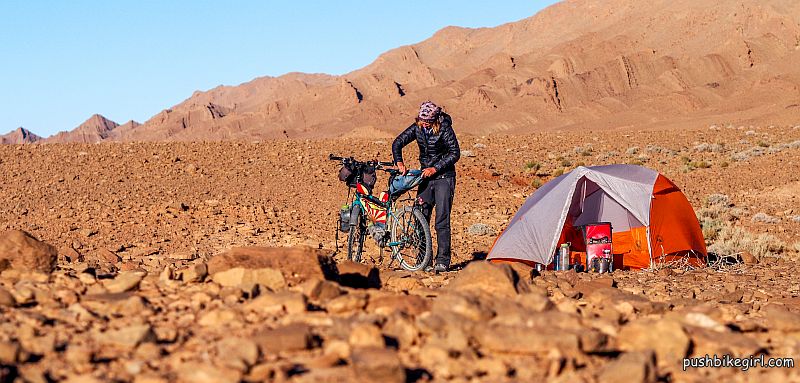
*SLEEPING*
Where did you stay at night? Did you feel safe enough to do wild camping?
Cindy:
When deciding if camping is safe I usually rely on the impressions I gained from the interaction with men.
In Iran I did not camp as I felt many men were sexually frustrated and I was followed often.
Oman and the UAE have such strict laws for offenders and I felt I was in remote enough areas to allow me to camp safely.
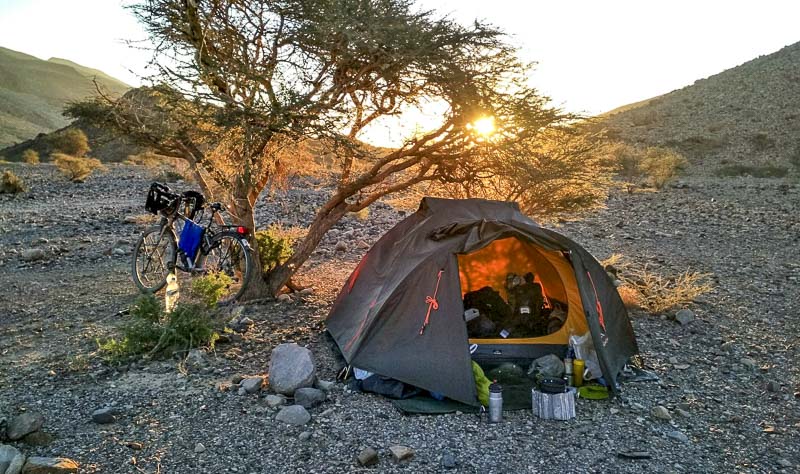
Ewa:
I camped wild in every country. I followed my rules setting up well-hidden camps after dark.
Sticking to my rules always worked, but later in Iran I stopped, as men there often followed me, and it was no longer advisable.
I would rent a room/bed at hostels from time to time as it was cheap. Also, I was lucky to be hosted through Warmshowers and with Couchsurfers in Turkey. All good experiences.
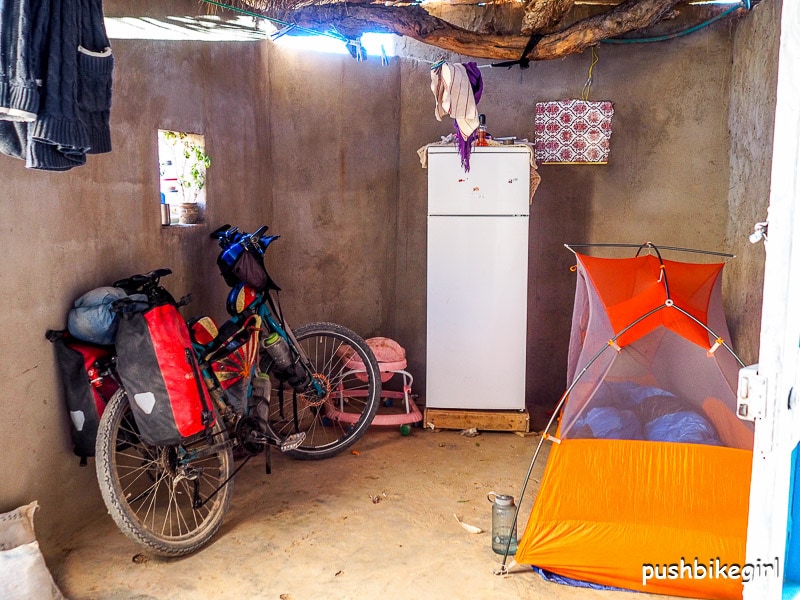
Heike:
I did not camp wild in Turkey and Iran – but I camped in all other countries and never had a problem.
In Turkey and Iran, I knocked on doors if I wasn’t invited by someone beforehand. I never stayed with only one man – in general, most men are married, and if they are not, they are usually living with their parents.
I always make sure that women are around before entering a house.
I asked for shelter in mosques or in Iran at Hilal Ahmar – the Iranian Red Cross. I also stayed in hotels, if necessary.
More about Cindy:
Meals on two wheels – Cindy is an expert in cooking meals and baking bread on the fire.
In this video, Cindy and I are sharing our experiences in cycling the world solo.
Cindy, among many other solo female cyclists gave me an interview a few years back – it’s still a very interesting read.
Cindy is also sharing her tips & tricks & hacks for bicycle touring.
The well traveled lady is also given advice for wild camping.
Along with lots of other information – she is also sharing the differences between cycling solo as a man and a woman in Iran on her own website.
More about Ewa:
Ewa also gave me an interview a few years back.
Like Cindy and I she is part of the wild camping post.
She is also sharing her knowledge on optimizing gear for your own bicycle touring trip.
Did you enjoy this article?
It would be great if you could share it among your friends.
Do you have a question? A thought or your own experiences you would like to share?
I am always happy to receive your comment….
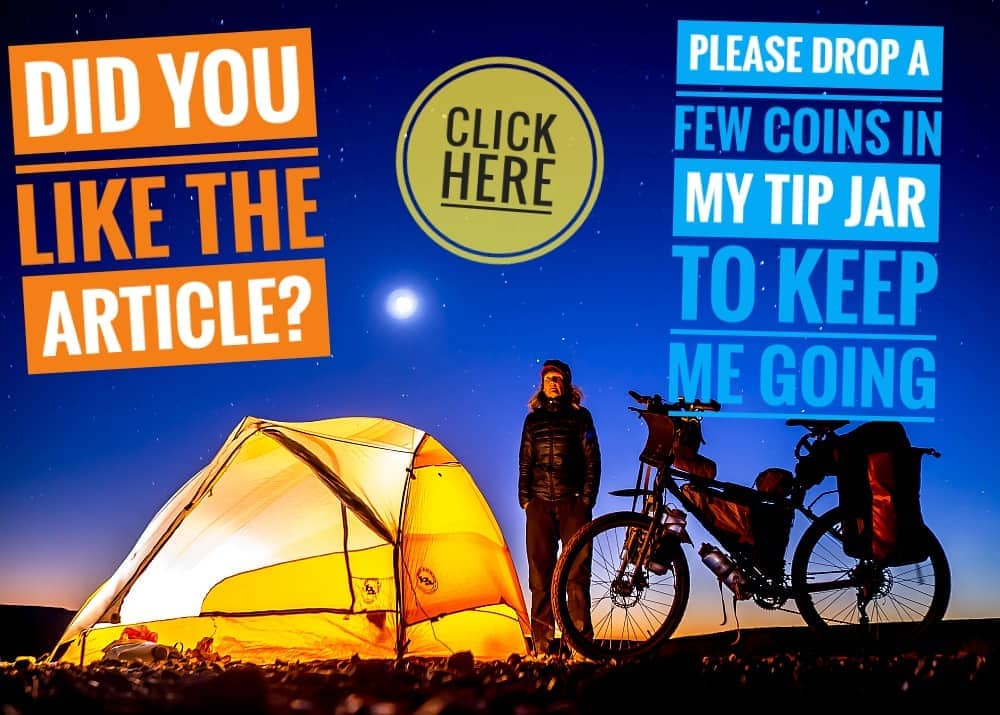
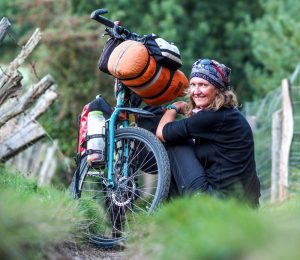





Brilliant article Heike, thank you for sharing your experiences. You and the other world travellers sharing their insights is giving the rest of us the courage to take the plunge and head out on our own bicycle adventures … as the saying goes”knowledge is power”.
Safe travels and greetings from South Africa!
Hello Louie,
Great to hear you enjoyed the article!
THanks for the feedback.
Happy riding….Heike
This was such an informative article. I’m not a bicycler but I’m always looking for good information about travel
Great to hear Christy,
this post is valid for any traveler….
happy traveling, Heike
Heike, having lived in a country dominated by Islam myself for three years I found your article very gratifying. It’s not often we hear anything positive these days about Muslims, the power of the ability of the few to distort, destroy and divide reigns. This is more than evident at the moment here in the US.
A big thank you to you and those who participated for the information and insights, I’m sure many others will find it useful. Just to comment on a couple, I would agree with Nicolas Marino, spending time in an Islamic country can be a very humbling experience. Being confronted with unflinching hospitality and generosity can leave one speechless. Experiencing laughter, smiling faces and warm welcome where all you can see is absolutely substandard in our Western thinking makes one rethink what has true value.
Thanks again for all the work that went into this post and I hope many others will benefit from what you have put together hear. I hope too that readers will share whatever they can too keep you going and sharing your stories and photos with us. Best wishes.
Big thank you Ronald!
I am sure living in a Muslim country must have been a very intense experience!
I assume it has changed you forever!
Best greetings from Africa, enjoy life, Heike
I want to thank all of you for beautiful photos and inspiration.
For eldery Muslim countries are wonderful as you receive a lot of respect because of your age.( I am 70) For example in Malaysia earlier this year almost every day my food was paid for by someone else. Have travelled in Marocco, Pakistan, Afganistan, Iran, Turkey , UAE, Egypt, Jordan, Syria, Tunisia
Thank you Lars,
Yes there is a lot of respect for elderly people!
Thanks for sharing!
Best greetings Heike
Thank you for this great post Heike . Because of your
positive experience riding through Iran my husband and spent four weeks touring there this year. It was an amazing trip.
Glad you enjoyed it Lyn….
Best greetings Heike
Perfect summary of real experiences. Thank you for this article.
Thanks Andrea, glad you enjoyed it.
Cheers Heike
Hello Hieke, beautiful photos as always, and an interesting read. What is the definition of a “Muslim country”?, when is a country considered a “Muslim country”?
And, are you also going to publish a blog about travelling in a “non-Muslim country”, and what to expect there?
I look forward to hearing from you.
Thanks Jan, not sure if you are teasing me or if you are serious?
The definition is – where Islam is the predominant religion – as written in the first sentence after the title.
The same as if it was a Christian country or a country where the majority is Buddhist.
And no – I am not planning on writing an article on non-Muslim countries – because the majority of the people who are reading my blog grew up in a Christian society, I don’t think I need to explain them what challenges they might have to face when they are traveling in another Christian country.
I am not sure I understand your comment….
Cheers Heike
I want to write about my country in this list. About what you should expect from Iran especially for solo female cyclists. I’m a young male cyclist from Iran who has been helping lots of cyclists with their challenges of the same title.
I have to sadly say that my country is never safe for solo females except some parts of the north. In the best situation avoiding camping, at least you should take the risk of a possible sexual harassment. The rest of the experience will be about weird faces seeing a solo female with those weird packs on a bike that will repeat everyday. Some would like to encounter to find out something through their curiosity and if it is in a remote place you will be worried about the purpose of that welcoming face. It’s not good to say don’t trust but you have to overcome your feelings and do the same. This will also make cyclists not to keep distant from the main roads too much and not trying to camp which is impossible to avoid in a bike trip itinerary. So that’s all why I always offer solo females to cycle in a group or with a guide companion! For me only because the variety of Iran’s nature is worth to experience it! Also I should add our warmshower’s community is so active to ask help.
Cheers
Sina
Thank you Sina for sharing!
Best greetings to Iran….Heike
Amazing post. Thank you for sharing. You write that the most difficult country is Turkey. I live in Istanbul. I know there are some conservative cities but most of Turkey not. I wonder what was the difficulties about you?
On the other hand wild camping is no problem in Turkey. If you are out of public areas stealth camping better of course. At public areas you can take permission from gas (at all gas stations there is at least one person day and night and wc) , restaurant, cafe etc. for camping. I did wild and stealth camping many times.
HI Cemal, thanks for your comment.
Istanbul is very different indeed. I wrote about what happened to me and also linked to it.
Turkey is full of very hospitable and friendly people, but not safe for wild camping or even cycling solo in remote areas as a solo female cyclist.
Best greetings Heike
I am going to read your posts about Turkey again. Best wishes.
Thank you for this. Useful and practical information from fellow and sister cyclists.
Interesting read..especially the ones from Solo brave women.
One more question.Would you recommend a young Solo woman to travel by herself by bicycle in Iran,Turkey or to avoid it?
Hi,
the article says it clearly – no!
I can not recommend it, especially to a young inexperienced woman.
If you go, stick to main roads and touristic areas. Avoid the Eastern and Southern parts of Turkey.
Stay on main roads in Iran. Dress accordingly – go in winter to be able to wear lots of clothes and dress like a man.
Good luck, Cheers Heike